#as it's central to my interpretation of this scene
Explore tagged Tumblr posts
Text
„Risotto Nero Observes“ - English Translation
(and my long thought session about it)

Thanks to a kind person, I finally have a link to an English Translation of the recently released short novel about Risotto Nero, called „Risotto Nero Observes“, written by Ayato Toya and translated by Hudgyn Sasdarl. It was published in the official JOJO SUMMER Magazine 2025 along with other short novels, also some festuring La Squadra members. But this one here is focusing on Risotto Nero and it is honestly a fantastic read. I would appreciate if you also share it around, so more people learn about more about Risotto Nero, since he is a beloved character of the JJBA fandom.
⚠️TW for: Canon typical violence (also involving children), murder and the whole mafia stuff you should be familiar with.
Below the cut, I will talk about my own thoughts about the short novel of my favorite character in fiction. It is just yapping in the end I needed to write down, but I also tried to analyze some stuff. I am not a native English speaker, so I am sorry for my mistakes in language. I did also not proof read it, so I am sorry for missing words or typos.
I am also adding some art I made of him because why not ✂️

First of all. Hi, my name is Kuja. I am a dedicated Risotto Nero centric artist and also a yumejoshi of him. Maybe you saw my art before if you like this character. If you do, maybe you also know how much this character means to me since he basically changed my life and brought me back into art and is the reason I found a wonderful community. Which is the reason I want to take my time and talk about this novel in my own interpretations and observations.
In short, this novel is exactly what I wanted to read about regarding to Risotto Nero.
It features no romance, introduces all of the members of La Squadra Esecuzioni and their steuggles, new characters and mostly is focusing on Risotto and his thought process, aka. his „observations“ which will be a reoccuring theme in this novel, which makes it a joy to read.
The short novel is timeline wise in the time around Christmas playing shortly after the murder of Gelato and Sorbet, which will also be a central theme.
Chapter 0:
A short scene where we witness Risotto Nero committing another successful assassination. As imagined, he is mostly using the camouflage abilities of Metallica to hunt down his targets. The kind of k1llingd he does keep being brutal and bloody, as we know later on also often to send an example and message from the highest of Passione.
It is interesting how peaceful the scene was written with the festive christmas music in the background which slowly fades into horror as the corpse is getting discovered by the passengers on that festive day.
Highlight of this chapter is for sure the absolutely high contrast of Risotto's deeds. On the one hand taking a life in a cold way, as expected from the leader of a hitman team. On the other we are experiencing a softer side on him, which many fans often speculated about. The target of Risotto's mission was just kicking a young pickpocketing girl away, making her almost fall to the ground and hurting her while Risotto, still invisible, catching her hand. Her only seeing iron powder on her small hands, probably wondering what just happened.
Seriously guys, this scene alone made me as a die hard Risotto Yume tremble in joy since it confirmed a lot of my own interpretations and headcanons about him, like having a soft spot for the younger generation. He did NOT have to help the girl, but he did, without ever getting anything in return since the girl could not even see him.
Risotto then sends a message of the confirmation of the hit to the boss who interestingly immediatly answers. Diavolo, are you camping your phone and computer all day?
Chapter 1:
One of the most interesting chapters for me personally because of the amount we learn about the hitman team again by observing how they interact with each other.
It is early in the morning and the hitman team is interacting not in person, but in a computer group chat, their personalities shining through.
We learn that Risotto Nero is currently residing inside a room which is part of a cheap apartment inside the outskirts of Naples. So is this only a temporary spot? It is written that Risotto brought his computer so it seems like he is only for a brief time living there. Do they have actual homes? Or do the members rather travel between short lived hideout spots from Passione? In the end, it is no luxury how they live. And this story often reminds us about this fact.
The hitman team is discussing about the most recent news recieved from the boss himself, about a new hit of a man called Rossi who plans to flee real soon and that Passione is entering the business of waste disposal. And two of their members should forcefully (a no won’t get accepted) transferred into this new branch: Formaggio and Illuso. Which causes a big uproar in the chat. Not gonna lie, it is very charming how they all are interacting and even throwing jokes in between. You see once again they all seem to have close bonds to each other. The typical duos are interacting, Pesci with his anniki, Illuso and Formaggio and once again Melone and Ghiaccio who really seem to get each other well, how they interact with each other really tells a lot about their dynamic.
Only one is not fully participating and rather „observing“, Risotto Nero, who tries to read in between the messages and how his subordinates are really feeling in this moment.
Also because of the most recent trauma they endured, the brutal loss of Sorbet and Gelato, two members who were tired of being treated like dirt and dismissively by the whole organization. Not respected, awful pay and the high risk of losing their lives on the daily. It is always interesting how sympatheticly La Squadra Esecuzioni is written, sure, they are assassins for the most dangerous Italian mafia but you can still emphazise with them. Many of us probably can relate to these feelings, not being treated and paid properly for the hard work we do and wanting to get their deserved amount. Their coworkers and close friends being sent to another occupation without their consent. Their capabilities not respected. Who wants to be treated like this? Sure, the motives are mostly motivated in an egoistical sense compared to an altruistic like some members of Bruno‘s gang do, which is one of the main differences of these gangs. But this is also why the hitman team feels more close, since they operate and think as a group, they want the best for themselves, the others coming afterwards, contrary to wanting to stop entire branches of their business for a better cause as a whole.
Even the boss is sending them more and more not so subtile threats how they have to submit and be obedient to his will. Like Pesci realizes, the messages are hidden in numbers. „Smorfia napoletana“ as it is called and we learn about which is a very clever stylistic choice of this novel which are basically numbers with meaning. And the boss knows very well what he wants to communicate to his hitman team, that he has the sole power over them.
And then we have Risotto Nero again. Who is, like I mentioned before, rarely participating in the talk and more inside his head and thoughts, trying to form plans, trying to see patterns and things. Now even more than before.
Because he feels guilty. Because he feels responsible for the death of two of his subordinates. He is angry at himself to not catching on clues of their planned rebellion against the organization. For not preventing them. For not hinder their deaths. In the end, he has to grief again. Something Risotto Nero always has trouble to deal and process. Once again there were people close to him taken away from him. By death. Something he now himself is known for. He, as the jet-black executioner of Passione. It is quite ironic.
Risotto really can’t let these thoughts of guilt go, he constantly is tormening himself about his and now decided to be even more keen on his men. To analyze, to think about their next steps, to prevent such a mistake. To observe.
It is not only that Risotto Nero is „surface“ level invested in his men. No, he „couldn't“ lose anyone else. He is responsible, as their leader. But why he can’t lose them?
Is it just because of the team itself? Do endure even more consequences by the boss and being dissolved by being useless? Is it because of the team spirit? Is it because he needs them for being able to work in the first place? Or is it actually because he can’t stomach any more losses? We don’t know anything about the lives of the hitman team outside their job. Do they have friends? Family? Or only each other? It seems they go around quite a lot, and being gangsters is not easy forming honest relationships between them and civilians. And even other teams inside Passione seem to be cautious, even hateful towards them. They don’t seem trustworthy for anyone else outside the team.
Also, this novel also confirms that Risotto truly cares about his subordinates since he is absolutely trying to analyze and insight for their mental states. He knows his team is processing trauma. They are still human. Luckily he knows as well how many of his members can deal with the stress or who of them is capable protecting themselves most efficiently. He thinks a lot, analyzes a lot and tries how to make a change and impact for their benefit and therefore a raise of the group morale. The mention that Risotto is thinking about giving Formaggio missons with a high chance of succeeding, just to improve his mental wellbeing because he alone found the corpse of Gelato…it tells so much about him. Risotto is absolutely observant and does not tolerate his own mistakes and puts on actual effort of being a good leader for his men. He does not want to any bad causality ever happen again between them. And losing them. As their leader, he needs to look out for the hitman team, they only have themselves.
After the team points out how quiet Risotto is the whole time, he tells them to take on this assassination by himself alone. He really is losing himself a lot inside his analytical thoughts.
Chapter 2:
This chapter is more revolving about the setting itself. We get to know the urgent this assassination is, putting pressure onto Risotto who usually keeps a cool head. Risotto will take out this murder of the soon trying to flee Rossi in a very crowded place, directly inside the mansion of this man who is tainted by very crude and unethical businesses himself. To put an example. Don’t mess with Passione. A job suited for Risotto’s brutal Stand capabilities.
The party being thrown in the luxurious mansion was right before Christmas, Rossi is intending to show his new adoptive son, Gennaro, another central character in this story.
This decadent luxury is a nice way to show again the difference of the worlds they live in.
By the way, it is very cute to imagine Risotto Nero inside a proper elegant suit he is wearing for this event. Sorry, needed to let this out.
In the next scene, an elderly couple speaks to Risotto about the over the top interior of the mansion. It made me actually laugh that Risotto was seriously being called „a wallflower“. I seriously can see this, he does not seem like the center of attention of a party. He also doesn't need to, he is supposed to be blending into the scene after all.
Afterwards Rossi appears into the spotlight and talking about the mystery of the „unopenable door“ and also just spewing out some meaningless anecdotes.
Also a rising and uncomfortable heat is described by the pair which is unsually also affecting Risotto Nero himself, which is surprising him. But it the reason is a sense of unease he tries to pinpoint to, until he realizes it is actually Metallica wriggling and moving inside his body and not actual nervousness about the mission itself. They are reaction to something inside this mansion which also is affecting Risotto‘s body. All this while he is planning how to cover the walls in red real soon.
Later on the party, Gennaro, a 14 year old boy is finally introduced to the story and guests, seemingly innocent and youthful, full of enthiusiasm.
Then the party guests were starting a tombola game, an Italian tradition, where we also get to know about the smorfia napoletana again and get introduced to new numbers and their meanings.
While Rossi and Gennaro are playing a farce in front of the crowd, Risotto thinks about the numbers and their meanings, as well as getting further affected by the temperature and discomfort inside his body.
The numbers are really dire and somewhat ironic when we take Risotto‘s backstory into account. 14 and 18, which are ages which his life turned around. 14 meaning „drunk“ and „18“ blood-stained. It is incredibly ironic just how these numbers describe his past, while the 90, before in his apartment room poster, is also appearing on his tombola card as well. His reaction and realizing these numbers was followed by a snort of him.
It really is amazing how much the author of this novel is taking Risotto‘s backstory into account and building onto that or referencing it. He constantly gets reminded of the cruel acts he decided to do many years ago which led him chose a path without any redemption.
Right after this, when the party and speech of Rossi is reaching its climax, Risotto plans to kill him, approaching him to close the Stand distance. It is interesting how he also is pointing on the target. It seems a bit suspicious, but the whole story is constantly describing that the others are not paying any attention towards Risotto Nero anways, he mostly blends in.
Also, Risotto seems to view himself as a „professional“ regarding his job as a hitman, not doing these murders for the fun of it. As long as they are paid and not caused by his own Vendetta. It seems like it is thrilling for him to catch up the ideal chance to carry out the murder for the most dramatic moment for reaching the biggest impact.
But right before Risotto could activate his Stand, the light faded, panic invokes between the guests and he lost track of his target who completely vanished after the lights come back to, the family of Rossi, his wife and Gennaro, worried about his absence and calling the police. But Risotto does not give up yet, further being suspicious of the unopenable door which not even the police who arrived could open.
After many unsuccessful attempts of opening the door and getting a new signal of Rossi outside the mansion, the police leaves again, making the party end.
It is very fascinating to witness Risotto Nero using his brain power to connect the dots and uncovering the secret of this unopenable door, using Metallica again to form objects like forks to the keyhole, which is also fake and therefore detecting a lie of Rossi losing its key. Risotto Nero has such an analytical and smart way to approach matters, trying to stay calm and composed. He knows this mission can't fail, the stakes are high.
Still, he fails to control his feelings once again, as stone faced as he is, a remark even his team mates are using towards him, which is truly sweet in a weird way, how they joke about this with their leader. He got a new message from the boss, who revealed how poorly Illuso and Formaggio will get paid and basically disrespected on the waste disposal branch. Succumbing to his anger, Risotto Nero breaks his phone, not realizing it until he hears the cracking sounds of the broken phone and through his Stand again inside his bloody hand, who seem to express his true thoughts and burning anger, screaming in their usual noises ordinary people can’t hear.
Metallica here in this novel acts very metaphorical as they really seem to be a vessle for his true feelings at times he has trouble expressing at the exterior. Be it the need of a leader of a hitman team, his past trauma or other reasons, but Risotto Nero often seems not in tune about his own feelings until later on. It is heartbreaking in my eyes that the unfair treatment of his men causes such reactions inside him. He does not want such a reality for them, he as a leader can’t allow to fail them again. And he is so sick of getting treated like this by the boss, his resentment growing stronger as well as his own rebellious spirit he tried to bury to protect his team, despite being treated worse every day. It is an endless circle of torment these hitmen need to endure. The boss basically told them to put their lives on the line, it is understable how enraged Risotto gets by that remark.
Risotto‘s appearance also gets briefly mentioned. He seems to have scarred lips, afding to his very rough a gruff apperance. Are these scars because of a neglect of himself of are these results of his past encounters?
But there was an even stronger reason making Metallica roar, the door seems to be connected and controlled with magnetism, also being most likely the reason for his own permanent discomfort on this place, which only faded within the power outage, which he now realized, the dots are connected now inside his head.
Chapter 3
In the end, the police did throw everyone outside before leaving but knowing Risotto and his Stand, He camouflages himself yet again and enters the mansion once more, iron will determonstion to uncover the secret and to carry out his bloody mission.
Inside he not only realizes all the stolen and proudly displayed good from Rossi, but also meets the adoptive son, Gennaro, once again, who detects the presence of Risotto despite not being able to see him. All while Rossi knocks and screams behind the unopenable door.
The mystery as Risotto figured out was an electromagnet inside the door, which is also the cause of his Stand reacting before.
Interestingly this novel confirms another headcanon I had about Risotto since a long time, as he tells Gennaro about the mechanism of the electomagnet which he read inside a book about waste disposal. He really seems like an intellectual and sophisticated person, reason he seems to be naturally curious about a lot of the world and its functions around him.
Gennaro lies about his reason being here, but the knife in his hand reveals his true intention, as Risotto observes, seeing the boy as a hindrance and thinking about peacefully assassinating him as well if he keeps being an obstacle of his urgent mission. Seeing that Risotto thinks about this dark act but not carrying out this murder of a young man, shows his hestitation despite him being a ruthless and experienced hitman. But, he is also seemingly intruiged by him, curious about his motives and the plan of the boy and realizing the benefit of unrevealing the crime of the young man. Also we can see that Risotto very well decides how „brutally“ he will take out a murder of a person.
Risotto lays out his own observations and detective work how the disappearance of Rossi was made possible during the power outage, which was caused by the extreme indoor heating and the lights of the christmas tree.
Quite funny how Risotto also uses his Stand powers to make a metal Tombola piece float in the air, it must have confused the boy to no end, not knowing about the supernatural Stands. He reveals another meaning of the numbers, 77, the devil, which was Gennaro‘s own remark against his new father. The man the young boy planned to kill himself, just like Risotto Nero.
Risotto is seemingly impressed how well crafted Gennaro is in planning his own assassination, but even the boy begins to flinch by the ghostly presence of Risotto, being called a grim reaper, which was also always part of his overall design.
He is curious about the motives of the boy, who wants to reveal the secret in front of Rossi himself, so they release him, with ordering the boy to drop the knife.
Rossi, completely out of breath, storms out of the room behind the door, questioning his son about the reasons of his hostile acts.
Then Gennaro revealed it all, how much Rossi has tormented him all these years after making him witness the torturing and murder of his own mother, just to get adopted by him again, probably making him suffer even more behind the disguise of a noble man, a habit of Rossi‘s twisted games. He even underestimated the boy to remember him after all these years, showing his arrogance and belittlement of others. All while the boy suffered in silcence and played an act, until now the time for his own assassination and revenge has come.
A motive and reason we all know defines Risotto all to well, his whole life. We get a glimpse of a backflash inside Risotto‘s head of the funeral of his cousin, many years ago. His mind turning dark just like his clothes. Full of rage and seeking justice of losing someone caused by another person. A person who will soon endure the same cruel fate, to make up for it again. But at what cost?
Risotto sees himself inside the boy. He was in he same situation many years ago, being 14 as well, his mind and spirit not able to process the loss of a family member. But choosing revenge led Risotto to a path of no redemption, a path of endless crime, just to get disrespected at the daily and putting his own life at risk, just to witness his loved ones getting erased from life again, not being able to counter the perpetrator this time and to submit.
No, this is a scenario Risotto experienced himself, he knows what this path will involve. I am very sure Risotto wants another fate for this boy, despite knowing the cathartic feeling of getting the revenge one seeked out for many years. Would Risotto chose this path himself again when he was reliving time? A scenario we will never know an answer of but here we see him protecting the boy for basically ruining his future life, a life without a real future, filled with crime, surrounded by mostly mean spirited people despite the closest ones.
So he tells the boy leave, threathening him to kill him if he refuses. He will carry out the mission, not only for the job, but also to spare the boy a life full of darkness.
But Gennaro does not accept, he suffered way too much from what Rossi has done, sleepless nights, trauma, feeling helpless, he only wants the release of revenge. The boy shows a strong will of resolve. And Risoto can relate so much, he truly understand what the boy is feeling. He knows these moments, this burning hatred and just bringing justice to end this once and for all. This is affecting Risotto even in such a way, that he lets his guard down, revealing his appearance, making the boy gasp in surprise by his dark and ghostly presence.
The moment of tension and two spitits connecting only got suddenly interrupted by the police forces, not hestitating to shoot on Risotto Nero as a quick act to save Rossi. The leader shortly needed a moment to process what just happened but decided to remove enough iron from the bodies of the officers to make them unconscious - a fairly peaceful decision for a hitman. But is it because he does not want to harm people who are not involved in his job or is it rather to spare the uproar of the corpses of police workers? Maybe a mix, still, it shows quite a new light of Risotto, being surrounded by members of his team who do not spare the lives of people close to their target mission. At least sometimes. Even tho, these hitmen seem all to have their own moral codex they act on.
After all, Risotto Nero is still cruel and cold enough to traumatize the people around his targets with his brutal and merciless killings, like he just wanted to do some hours ago with all the guests and family Rossi. I really enjoy how morally grey Risotto is written which really makes him an appealing and interesting character, and I try to say this as unbiased as possible.
While this short moment of being focused on the police, Rossi takes action and stabs Gennaro with his own knife he dropped earlier, directly into the stomach of the young man.
Now it was finally the time Risotto needed to act, bringing a gruesome end and torturing Rossi with nails made from Metallica‘s powers, making him suffer a long time before he finishes finally his assassination.
It is very symbolic that Risotto basically crucifies Rossi with the way he pierced iron nails through hus hands, it is very symbolic for a multitude of reasons and made me think.
If we think about Christian Religion, the punishment of being cruzified was reserved for the sinners. A way to show dominance and control by the upper hand instances, which is Passione.
It was often used for „low-life“ criminals and slaves back then, basically mocking the luxurious life of Rossi.
The dramatic display of the corpse for everyone to see to give off a warning: do not act like this sinner. It is an open display of Rossi‘s long life of wrongdoings and crime and how he now must suffer the consequences, caused by his sins. Since it is also a tool of enforcing and showing social control, it also fits the method of Passione scaring other gangsters and enemies. They are in control and on the top. They are showing psychological warfare and invoking public fear.
But also, does this act also is an act of mercy to bring salvation to Gennaro? Making Rossi die for his cruel sins to release the darkened spirit of the young man? It is quite interesting to think about this potential interpretation.
Risotto then rushed to Gennaro, picking him up, telling him that Rossi will now suffer for his sins. As Gennaro is seemingly dying in Risotto‘s arms, smiling, he found finally peace of his mind. His last act is showing the tombola card with the number 90 again, and we finally get know its meaning.
Fear.
This is what Gennaro wanted to overcome, feared and suffering by his past, not being able to act, not knowing if the feel of being haunted by Rossi will ever fleet away, now that the boy was adopted by him, probably even abused by new methods of Rossi‘s twisted mind.
Fear is what is haunting Risotto Nero and his team since weeks, enforced by the boss, treating them like dogs, making with the hitman team whatever he feels to, not respecting them, humiliating them. No regard for their talents, always reminding Risotto of his failure as a leader he cannot stop feeling guilty for. He needs to act. He can’t let this continue. But it is fear he also feels, not wanting to lose more of his men. But what is the other path? An endless cycle of ridicule? Risotto has enough. In this moment the brave acts of Gennaro must have inspired him to also put a stop onto all this. He can’t let fear to keep controlling him and his men.
And then, while Risotto is scolding Gennaro in an endearing way, talking to him like as if he was scolding one of his subordinates, like a mentor, he transforms the iron tile inside the boys hand and forms a staple.
Chapter 4
A short time skip. The news were talking about the gruesome murder of Rossi by a gangster and how this gangster also tortured a young boy was saved by a „skilled police officer with a stapler“
…a story wirhout any sense. Only Risotto Nero, Gennaro and the reader know the truth about what happened. Risotto did an heroic act, no one will ever know about, probably not even Gennaro himself, since he was barely left conscious when Risotto stapled his wounds with Metallica.
It is unbelievably tragic but also needed, as Risotto Nero has a reputation to hold. On this day, he took a life but he also saved another. And not only in a physical way, Risotto prevented Gennaro, who returned into a orphanage, to chose the same path as him many years ago. He brought salvation to his tormented and young spirit, finally removing his tantalizer from life. The boy has now again a chance of a normal life, a life, Risotto does not have himself.
Once again, Risotto brought success to Passione, without ever getting properly rewarded, payment as low as ever. Nothing changed. Only Risotto‘s resolve has.
He gathered his men again, this time in person, inside their usual hiding spot we know of. Which seems to be a rare occurance as the hitman team remarks, last time being the day they got these dreadful horrible packages of thin pieces of one of their members.
The waste disposal transfer seems to be on hold, Illuso and Formaggio being spared from changing teams this time, and they begin bantering again. Knowing they are essential to the team and valueing being among them.
This scene also confirms the basically fanon of the fandom that Prosciutto is a smoker - he indeed does.
Suddenly Risotto began to talk, he is resolved. The boss won’t continue to play with them like cheap and disposable puppets. The incident with the determined Gennaro and collecting his strength depsite still being scared, made him realize to act as well. Or else he and his men will keep this vicious cycle of being a team of assassins who despite carrying out the missions with success, still are only good enough to get potentially transferred to deal with garbage. It is a clear message, like the boss always does.
It is finally enough, time to free themselves from the chains.
He swears to overthrow the boss and organization. His will and decision strong as iron. Wanting to claim what has been taken from „HIM“.
This remark seems to be a direct hint on his pride, how much he personally has lost in his life and how sick he is of all this, fighting for a better future, for himself. But also for his team. To avenge the deaths of Sorbet and Gelato, to make their loss not being unresolved.
His subordinates being in silence, making Risotto questioning how they will decide, will they stay loyal to the team or to the organization of Passione? By now, they can only hold themselves only the little clues and whereabouts of the boss, events which unfold in the storyline of Vento Aureo.
Until then, Risotto Nero will continue to observe, to catch every clue to fulfill his revenge and bring dark glory and a better future for his team, them alone, against the remaining world. The stakes are high, him being the leader is responsible for the outcome of this resolve. Unfortunately, we know how this decision will turn out in the end. They were so close but it still was all for nothing, the mostly self motivated team of assassins' fate has already decided and it will lose against the altruistic motives of the gang of Bruno Bucciarati.
Okay, this was long. I don’t know how many of you really did read this. If you did,
Thank you.
As a summary, this short novel is a fantasticly written story about Risotto Nero and his team of hitmen, also shining with hints of fanservice, as confirming many ideas the fans had about them, and letting them all stay in character without ever breaking depsite all the bantery conversations, how close these men are. In the end, they are all they have.
This story really did Risotto Nero justice as a character, not once ever conflicting with the hints we knew about his personality but also expanding on them.
He is ruthless, cold and stone-faced, as we witnessed already in the original source material. But what we learned in this novel about him throws a new light on him, showing also his softer side.
He IS concerned about his teammates, he feels guilty about his failures as a leader, he can absolutely not cope with grief and has trouble managing his outbursts of anger - even targeting against himself and hurting himself. He looks after the wellbeing if his men, concerned about their mental health and respecting their trauma, not ever ridiculing them and their feelings. Risotto Nero is absolutely not emotionless, his inner world and thoughts are rich, which he just isn’t able to express for probably a multitude of reasons. He even shows compassion for strangers. There was no reason to save the girl from falling harshly to the ground, there was no reason to spare Gennaro, he even knows Risotto‘s face and could be therefore a danger in the future.
But he did help them. And the most cruel fact about this is, no one of them or the others, probably not even his men, will know about these acts and truths (only if they will maybe figure it out by themselves by the staples).
He is not a person who wants to be a hero, he knows he isn’t and he will never be, too many lives did he take by now. But, these little deeds to mercy and kindness are probably a secret of him, no one ever needs to know about. He has his own reasons to act, his own way. His own moral code and his own way to act.
This all makes Risotto Nero such a very well written character in my eyes, combining some of the worst human sins but also showing signs of compassion and protectiveness, like preventing others from a path full of pain or wanting to fight for his men, to finally get what they deserve.
I thank the author of this story, Ayato Toya, by a lot. This novel was a joy to read, which I already did by a couple of times. Also thanks to Hudgyn for the wonderful translation, which is very well and clearly written.
This novel probably strenghtened my own feelings for this character by a lot. I can’t express how happy I am this was written at all, if now this story gets and animated adaptation, my life will be complete. Come on, who does not want to see Risotto inside a suit?
Thank you for reading.
Oh yeah, here is my artwork of him again I made for this novel, I did imagine how he might look with a suit.

#risotto nero#Risotto Nero Observes#short novel#Risotto Nero Novel#jjba#la squadra#jojo's bizarre adventure#la squadra esecuzioni#risotto#golden wind#jjba part 5#jojo magazine#JOJO#jojo no kimyou na bouken#yapping#thoughts#risotto nero my love#he is very important to me#this is why I needed a room to let out my thoughts#my art
220 notes
·
View notes
Text
Heavy spoilers for Joker: Folie à Deux beneath the cut.
Joker 2019 is a movie that is often misunderstood, and one that means a lot to me. It doesn’t quite manage to nudge out some of my childhood animated favorites like The Last Unicorn and Watership Down, but Joker is definitely in my top three favorite live action movies. It got me back into writing fanfic after a long dry spell.
I didn’t think it needed a sequel. Most people didn’t. The first movie told the story it needed to tell. I was wary going into this. After hearing that it was a musical (and with Gaga as Harley?), I didn’t know what to expect but I thought that even if it was bad, even if it completely misfired, it would at least be an entertaining and funny trainwreck.
Turns out, it’s not funny at all. This movie gutted me.
I wish it didn’t exist. The experience of watching it was…I’m still processing it, but I think I can say at this point that it was an unpleasant experience, but also a captivating one. I hate it but I also weirdly have a higher opinion of it than most people seem to. I feel like it was tonally true to the first movie. I think Phoenix and Gaga both breathed life into their roles. The musical numbers didn’t seem strictly necessary but they also didn’t detract from the experience for me. Music was an important element of the first movie as well.
I also think the central premise is an interesting one. Arthur, incarcerated in Arkham, is facing the possibility that he’ll be sentenced to death for the murders he committed in the first movie. His lawyer is aiming for an insanity defense and tries to convince the jury that the Joker is a separate personality—that Joker, not Arthur, killed those people. In order to save his own life, Arthur needs to convince the jury that he’s not Joker…or he can take a different path. He can say "fuck it," fully embrace the Joker persona and live whatever time is left laughing and watching everything burn. This is what Harley "Lee" Quinzel, who admires Joker and the chaos he represents, wants him to do.
In the end, he does neither.
After being forced to sit in silence for days and listen to a defense that both infantilizes and dehumanizes him, reducing him to a set of symptoms, stripping him bare and putting all his pain and humiliation on display, Arthur can’t take it anymore. He fires his lawyer (who represents his best hope of survival) and elects to represent himself. Initially he tries to represent himself as Joker, to lean into that persona, but he’s not feeling it anymore…especially after the confrontation with Gary Puddles, the guy who was probably his only true friend before he became Joker. In the first movie, Arthur spared Gary’s life but left him deeply traumatized after he witnessed the death of Randall, the coworker who bullied Arthur. This conversation with Gary was one of the most riveting parts of the movie for me. There is a nakedness and rawness to it. Arthur tries to say "fuck it," but ultimately, he can't. Not in the face of Gary's pleading and pain.
After this, some horrible things happen to Arthur in Arkham. The guards beat him and brutally assault him. They kill his fellow inmate who tries to offer him support, because the system is still ruthless and still failing vulnerable people. Arthur is left broken, helpless. Again. Some people have interpreted this scene as the reason he ultimately sheds his Joker persona, but I think it would have shaken out differently if not for that earlier conversation with Gary. Because Gary is possibly the only person who truly cared about Arthur, when he was only Arthur—a fellow outcast, and the only guy who never made fun of him.
Joker makes fun of Gary, because Joker makes fun of everything. And Arthur realizes that he’s not—doesn’t want to be Joker. At his core, he's sick of pain and violence, both his own and other people's. He wants to try to break the cycle.
In the end, Arthur stands before everyone not as Joker but as Arthur Fleck—he stands alone and naked, shattered, traumatized, with no remaining allies, and he takes responsibility. He says that he did those things. He did them because he was having a mental breakdown, yes, because he was wounded and wronged by an unjust world, but he regrets it, now. He hurt some bad people, but he also hurt some people who didn’t deserve it. He’s tired of being the clown. He just wants to live. That was all he ever wanted, really. Just a little bit of kindness and respect.
This is his truth: Joker is a part of him, but a part that was born out of pain. His deepest self is Arthur. In admitting that, he lays it all on the line, in that moment. And this is, in my opinion, the bravest thing he could have done. I had my hand over my heart for this whole scene.
And for this small, fragile act of courage, he is utterly forsaken by the world. Lee—the one person who he has a connection with—is in love with Joker, not Arthur. She walks out of the courtroom. She abandons him in his moment of greatest need—not out of malice, but out of weakness. Because she wants to live in a fantasy world and she can't handle the reality of who he is: not an embodiment of chaos and power, not a symbol, but a man, a vulnerable man who is full of regrets but who is trying, in his own confused way, to be better.
The first movie was bleak but it offered a glimpse of a twisted kind of hope at the end with Arthur finding inner peace even as he’s condemned to a life in psychiatric incarceration for his actions. This movie takes that bit of hope and grinds it into the dust. It’s a tragedy, through and through.
Arthur’s random, pointless death at the end feels almost redundant because it’s made clear by that point that his spirit has already been slain. His connection with Lee was all he had, and when it’s revealed to be an illusion, that’s it. He can no longer exist as the Joker but he can’t exist as Arthur, either. He tried his best and was rejected for it. It didn’t work. He’s done.
There are a lot of takes about how this movie should have gone, and honestly, most of them sound terrible to me. I think this is the only way a sequel could have gone while remaining honest, which is why I didn’t want a sequel.
You can’t hear me, Arthur, but I love you, and I’m proud of you for standing before the world as yourself, and you didn’t deserve to die the way you did.
This world is fucking cruel.
753 notes
·
View notes
Text
the ending
For my sanity, a collection of all the ways in which the Veilguard ending is a bad way to conclude Solas' arc. All of this has been said before but I think it's quite striking to put it all together.
(As a caveat, the closing scene itself is aesthetically very beautiful and clearly made with love; there's just this big disconnect between the form and the content)
1) The only way for Solas to 'atone' is for him to be released by someone who has been manipulating him his whole life and there is a very plausible interpretation of the text in which she abused him and/or owned him as a slave.
2) Not only does no one listen to Solas about how binding spirits is abusive, the game ends with us binding him, a former spirit, either by force or by manipulating him in a vulnerable moment. When he tries to say something about spirits in this scene Rook immediately cuts him off.
3) All three endings are punitive and cruel, sending a person whose greatest fear is dying alone into eternal solitary confinement, and thus conveying a very retributive approach to punishment. Maybe you can headcanon something different in the atonement case, but that is not what is presented in game: the last thing we see of him is being sent away alone. You can make it slightly better by sending Lavellan or Rook with him, but two people being trapped in prison together forever is not really a good outcome either.
4) In a game that is all about healing through community, with a character whose central flaw has always been insisting on working alone, it makes no thematic sense for his ending to be that he is sent away alone.
5) This is blood magic, one of the Big Evils of the game, and yet the fact that Rook uses blood magic is never acknowledged or commented on.
6) The same endings are available regardless of his relationship with the Inquisitor and Rook, thus rendering his whole character arc in Inquisition and all his interactions with Rook completely pointless (Solavellan is the one exception to this and I love that it exists but I don't think this should have been the only way to get an even slightly hopeful ending to his arc).
7) Solas has no agency. What happens to him is entirely decided by Rook, his own growth plays no part in it. He is just passing directly from being controlled by Mythal to being controlled by Rook.
8) It is extremely unclear how any of this is going to work, e.g. if Solas has the dagger with him couldn't he just kill himself to take the Veil down? The Trick ending in particular makes no sense at all.
Note that none of this is about thinking Solas should have a happy ending. I was personally expecting that his atonement would involve him sacrificing himself and in many ways I honestly think that would have been better.
One or two of these things might have been ok, but put them all together and this is just a very icky collection of things to endorse and a spectacularly uncomfortable note to end on. It's honestly quite puzzling to me that anyone thought this would be a good or respectful way to conclude this arc which has been so central to the series.
183 notes
·
View notes
Text
i've seen some people say that jayce's speech to viktor at the end of act 3 rang hollow to them because viktor's illness and disability still caused him a lot of pain and suffering and it felt like jayce was invalidating that but that's not how i interpreted that scene at all. one of the first things viktor ever tells jayce is that he knows that people look down on him because of his disability. piltover is the city of progress. it's stunning and golden and perfect and so viktor's disability only highlights how out of place he is. we know that his appearance, especially when it's changed by the hexcore, bothers him because he hid those changes from jayce and looked visibly upset about it when he emerged from his coma. not to point to the line again but 'i'd rather you not be here for what could be my final form' and 'please don't let them see' says a lot about what viktor thinks of his body. when he becomes the machine herald part of that decision is that he'd rather reinvent himself completely than remain an imperfect version of his old self
and jayce understands how other people's perception of him affects his self image. he's aware of viktor's disability and his illness and he's constantly accommodating for that, whether it's helping him with hexcore experimentation or giving him his seat at the council table. he isn't blind to how that affects viktor's life. but what he's saying doesn't come across to me as 'you're perfect just the way you are' but 'i want you to know that i never thought less of you because of your body. you're not broken to me and i love those parts of you even if you don't' like it's a very central part of jayce's season 2 arc that he also becomes disabled when he travels to that other universe. he's now speaking from experience with a new understanding of how disability changes your perception of yourself and impacts your confidence. the reason why that speech worked is because it was exactly what viktor needed to hear. that an imperfect body is just as worthy of love
389 notes
·
View notes
Text
Point of View: the Biggest Thing You're Missing!
Point of view is one of the most important elements of narrative fiction, especially in our modern writing climate, but you rarely hear it seriously discussed unless you go to school for writing; rarely do help blogs or channels hit on it, and when they do, it's never as in-depth as it should be. This is my intro to POV: what you're probably missing out on right now and why it matters. There are three essential parts of POV that we'll discuss.
Person: This is the easiest part to understand and the part you probably know already. You can write in first person (I/me), second (You), and third person (He/she/they). You might hear people talk about how first person brings the reader closer to the central character, and third person keeps them further away, but this isn't true (and will be talked about in the third part of this post!) You can keep the reader at an intimate or alien distance to a character regardless of which person you write in. The only difference--and this is arguable--is that first person necessitates this intimacy where third person doesn't, but you still can create this intimacy in third person just as easily. In general, third person was the dominant (and really the only) tense until the late 19th century, and first person grew in popularity with the advent of modernism, and nowadays, many children's/YA/NA books are written in first person (though this of course doesn't mean you can't or shouldn't write those genres in the third person). Second person is the bastard child. Don't touch it, even if you think you're clever, for anything the length of a novel. Shorter experimental pieces can use it well, but for anything long, its sounds more like a gimmick than a genuine stylistic choice.
Viewpoint Character: This is a simple idea that's difficult in practice. Ask yourself who is telling your story. This is typically the main character, but it needn't be. Books like The Book Thief, The Great Gatsby, Rebecca, Dr. Jekyll and Mr. Hyde, and the Sherlock series are told from the perspective of a side character who isn't of chief importance to the narrative. Your viewpoint character is this side character, the character the reader is seeing the world through, so the main character has to be described through them. This isn't a super popular narrative choice because authors usually like to write from the perspective of their most interesting character, but if you think this choice could fit your story, go for it! You can also swap viewpoint characters throughout a story! A word of warning on that: only change your viewpoint character during a scene/chapter break. Switching mid-scene without alerting the reader (and even when you do alert the reader) will cause confusion. I guarantee it.
Means of Perception; or, the Camera: This part ties the first two together. If you've ever heard people talk about an omniscient, limited, etc. narrator, this is what they mean. This part also includes the level of intimacy the reader has with the viewpoint character: are we in their heads, reading their thoughts, or are we so far away that we can only see their actions? If your story is in a limited means of perception, you only have access to your character's head, eyes, and interpretations, where an omniscient narrator sees through all characters' heads at once. (This doesn't eliminate the viewpoint character--most of your writing will still be in that character's head, but you're allowed to reach into other characters' thoughts when needed. You could also be Virginia Woolf, who does fluidly move through everyone's perspectives without a solid viewpoint character, but I would advise against this unless you really are a master of the craft.) Older novels skew towards third person omniscient narration, where contemporary novels skew towards first person limited. You also have a spectrum of "distant" and "close." If omniscient and limited are a spectrum of where the camera can swivel to, distant and close is a spectrum of how much the camera can zoom in and out. Distant only has access to the physical realities of the world and can come off as cold, and close accesses your character's (or characters', if omniscient) thoughts. Notice how I said narration. Your means of perception dramatically effects how your story can be told! Here's a scene from one of my stories rewritten in third-person distant omniscient. The scene is a high school football game:
“Sometimes,” he said. “Not much anymore.” “It’s not better, then?” She shivered; the wind blew in. “A little.” His tone lifted. “I don’t know if it’ll ever be better, though.” She placed a hand on his arm, stuttered there, and slipped her arm around his waist. “Did it help to be on your own?” He raised an eyebrow. “You were there.” “Yes and no.” “And the guys, the leaders.” “Come on,” she heckled. “Okay, okay.” Carmen sighed. “Yeah, it helped. I don’t think—I don’t know—I’d be me if they’d fixed it all.” She grinned. “And who might you be?” “Oh, you know. Scared, lonely.” He fired them haphazardly, and a bout of laughter possessed him which Piper mirrored. “Impatient.” “And that’s a good thing?” “No.” He sat straight. “Gosh, no. But I don’t want to be like him, either.” He pointed to the field; Devon recovered a fumbled ball. “He’s never been hurt in his life.” She met his eyes, which he pulled away. “You don’t mean that," Piper said. “Maybe not. He’s too confident, though.” The cloth of Carmen's uniform caved and expanded under Piper's fingers.
With distant-omniscient, we only get the bare actions of the scene: the wind blows in, Piper shivers, the cloth rises and falls, Carmen points, etc. But you can tell there's some emotional and romantic tension in the scene, so let's highlight that with a first person limited close POV:
“Sometimes,” he said. “Not much anymore.” “It’s not better, then?” Frost spread up from her legs and filled her as if she were perforated rock, froze and expanded against herself so that any motion would disturb a world far greater than her, would drop needles through the mind’s fabric. A misplaced word would shatter her, shatter him. “A little.” His tone lifted. “I don’t know if it’ll ever be better, though.” She placed a hand on his arm, thought better, and slipped her arm around his waist. “Did it help to be on your own?” He raised an eyebrow. “You were there.” “Yes and no.” “And the guys, the leaders.” “Come on,” she heckled. “Okay, okay.” Carmen sighed. “Yeah, it helped. I don’t think—I don’t know—I’d be me if they’d fixed it all.” She grinned. “And who might you be?” “Oh, you know. Scared, lonely.” He fired them haphazardly, and a bout of laughter possessed him which Piper mirrored. “Impatient.” “And that’s a good thing?” “No.” He sat straight. “Gosh, no. But I don’t want to be like him, either.” He pointed to the field; Devon recovered a fumbled ball. “He’s never been hurt in his life.” “You don’t mean that.” She spoke like a jaded mother, spoke with some level of implied authority, and reminded herself again to stop. “Maybe not. He’s too confident, though.” Piper felt the cloth of his waist cave and expand under her fingers and thought: is this not confidence?
Here, we get into Piper's thoughts and physical sensations: how the frost rises up her, and how this sensation of cold is really her body expressing her nervous fears; how she "thought better" and put her arm around his waist; her thought "is this not confidence?"; and how she reminds herself not to talk like a mother. Since I was writing from the close, limited perspective of a nervous high schooler, I wrote like one. If I was writing from the same perspective but with a child or an older person, I would write like them. If you're writing from those perspectives in distant narration, however, you don't need to write with those tones but with the authorial tone of "the narrator."
This is a lot of info, so let's synthesize this into easy bullet points to remember.
Limited vs. Omniscient. Are you stuck to one character's perspective per scene or many?
Close vs. Distant. Can you read your characters' thoughts or only their external worlds? Remember: if you can read your character's thoughts, you also need to write like you are that character experiencing the story. If child, write like child; if teen, write like teen; etc.
Here's another way to look at it!
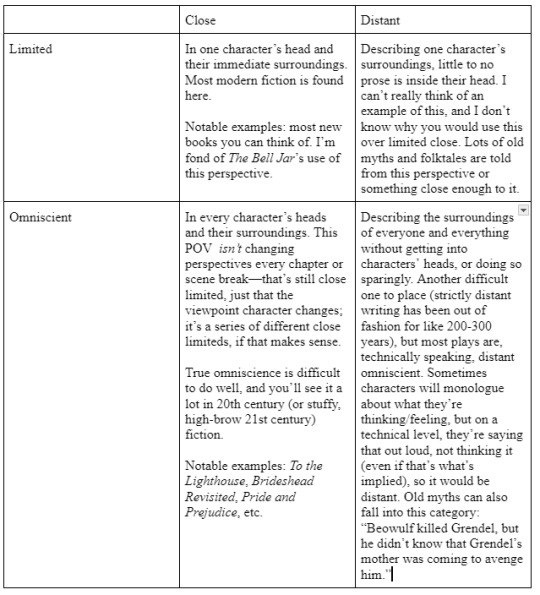
This is a confusing and complex topics, so if you have any questions, hit up my ask box, and I'll answer as best I can. The long and short of it is to understand which POV you're writing from and to ruthlessly stick to it. If you're writing in limited close, under no circumstances should you describe how a character other than your viewpoint character is feeling. Maintaining a solid POV is necessary to keeping the dream in the reader's head. Don't make them stumble by tripping up on POV!
#writeblr#writing#writing advice#fanfic#writers on tumblr#writing questions#creative writing#bookblr#writerscommunity#booklr
717 notes
·
View notes
Text
whether akechi likes sweets is something hotly debated, with people coming down strongly on both sides. if you look at what he actually says, i can understand why you would come to either conclusion. but i think we can pretty definitely say that based on canon, akechi doesn't dislike sweets--and probably likes them more than he claims.
as far as i can tell, fanon akechi having a sweet tooth comes from his "delicious pancakes" comment along with the detective prince's shtick about having a sweet tooth. but then royal came out and seemingly contradicted this interpretation with akechi's rank 3 and his scene with kasumi at the café he frequents, when he says his sweet tooth is just a marketing strategy. but let's look at what he actually says.

first, he says that he has no strong opinions either way on sweets. he says he doesn't hate them, but he doesn't love them either. he seems mostly indifferent. put a pin in that, i'm gonna come back to it later.


but here comes the really interesting thing that i think a lot of people--especially those who think akechi dislikes sweets--overlook. you and akechi order a sweet dish, you ask about his sweet tooth, and he says he doesn't really have an opinion on sweets either way. then you eat the dish, and he says he was pleasantly surprised and deeply enjoyed it after all.
this doesn't mean akechi loves sweets, but it definitely contradicts the idea that he hates them. he at least can enjoy them sometimes. maybe his surprise indicates that he expected to hate it, but since he just said he has no strong feelings either way, i think he expected to be indifferent. but surprisingly, he liked it after all. remember that pin? keep remembering it. this is also gonna come back later.
finally, we have the infamous scene with akechi and kasumi at the café.


but notice, he never says "i actually hate sweets." he just says that his strong sweet tooth is a marketing strategy, he never gets into his own opinions on it outside that. i think this is further evidence that he just has no strong feelings either way.
also, notice that he is the one to have chosen this café for them to go to. if he really hated sweets, would he repeatedly take you to a café that serves sweets of his own accord? it's not like he's being forced to take you here for PR, these are personal outings. he seems to genuinely like this café outside the marketing.
so: what did we get from these two scenes? first, akechi claims to not have any strong opinions on sweets, but then genuinely enjoys a sweet dish anyway. then, he says that his sweet tooth is something they play up as a marketing strategy. so, what does this all mean?
let's return to that pin from earlier. i think akechi does actually like sweets, the problem is, he's gotten so caught up in the mask of the detective prince, he's forgotten what he actually likes and dislikes. his performance of liking sweets is just that--a performance. but once he's stripped that performance away and admitted the truth of indifference, he finds another surprising truth hidden beneath that--he does enjoy sweets, after all.
in my opinion, this is all reflective of a central truth to akechi that i've gotten into before in other metas: he doesn't know who he really is. he's so caught up in his dual masks, each so contradictory and so extreme, with their chaotic mix of lies and truths that are so difficult to parse, that he no longer knows what is genuine and what's invented. he doesn't know if he likes sweets or not--and he doesn't care. what does it matter, in the end? he likes sweets because that's what the detective prince likes for his mask and that's all that matters. what his actual opinions are are ultimately irrelevant to his goals, so he doesn't stop to think about it and come to his own conclusions.
akechi lives for the sake of his end goals, and gets lost in the masks until their lies might as well be true to him. he doesn't care what he really thinks, because he isn't really his own person anymore. he only exists to enact shido's will, and his own thoughts and feelings get further lost and forgotten to shido's puppet strings.
so, does akechi like sweets? in my opinion, yes. not as much as the detective prince does, but he likes them. he probably has his own specific preferences and tastes for different kinds of sweets just like anyone else. but he doesn't know what those preferences are, because the detective prince likes all sweets. and so when he dislikes one sweet thing but has to perform love for it anyway, a resentment against sweets starts to build up. he doesn't care about sweets, it's just a mask. he doesn't care about any of this. he hates sweets, he loves sweets, he doesn't have any strong opinions at all because none of this even matters anyway.
goro has an old memory, of his mother making him pancakes for breakfast. before she stopped making them food altogether. goro loved those pancakes. he loved sweets, and most of all, he loved it when his mother made him a meal, putting her love for her son into those delicious pancakes. but that's an old memory. goro doesn't like thinking about his mother. he'd rather forget that time, when he still had hope.
every time the detective prince performs love for his sweets, a part of him can't help but remember anyway.
#i know that last part is all strictly headcanon but hopefully i built a convincing case up to that point for why canon supports me#anyway happy birthday akechi <3 i hope youre eating a delicious birthday cake today <3#goro akechi#akechi goro#p5#sera metas#sera talks goro
101 notes
·
View notes
Text
I have absolutely no words to describe how psychically, physically and spiritually impactful this scene was and still is on me. Despite this, I feel I could describe in keen detail its significance from a character perspective. [warning for unscripted and unfiltered fixation rambling]
The way Gihun centralises himself in situ with Sangwoo’s morals. The way Sangwoo is immediately angry at him for even suggesting he would hurt Gihun, but biting his lip back when he realised that Gihun actually considers that scenario in his anger. Gihun’s unwavering gaze momentarily breaking through Sangwoo’s hardened facade, his eyes flickering as he dodges Gihun’s stare, unable to form a response. Sangwoo is such a deeply complex character (as is Gihun ofc) but in such a way that all his thoughts and moral code is obscured through the lens he wants others to see, meaning it lacks full truth on the surface. His appearance is so strictly crafted to what he wants others to perceive that he loses himself in it and when Gihun punctures that presentation it wounds him. Gihun sees through him, and says the exact thing that breaks the camels back. Sangwoo is vulnerable in that knowledge. They are both so vulnerable in this moment, but it’s the central moment that Gihun’s understanding of Sangwoo is projected at him without a veneer of kindness. He wants Sangwoo to feel guilty, and he succeeds in this; despite how firm Sangwoo is in his own part that he plays in the games and his lack of copability for his actions, he stutters under this question. Gihun targets the one thing he knows Sangwoo isn’t able to keep that front for.
Himself.
Gihun has grown up with Sangwoo, seen the pits of poverty with Sangwoo and is now face to face with him and all that history under the impression that Sangwoo’s willingness to kill under these circumstances will extend to him. It doesn’t. And that defined Sangwoo’s one stake in the game;
(Bit of personal interpretation here because I’ve been so solid in my idea of Sangwoo’s true intentions when traversing the game for 3 long years)
Gihun being alive to see the money that he knows he’d never live to use, even if he left victorious.
I adore them. I hate them. I can’t stop thinking about them. They are so deeply important to me. I. Them. They.
It’s 5am, I need rest.


254 notes
·
View notes
Text
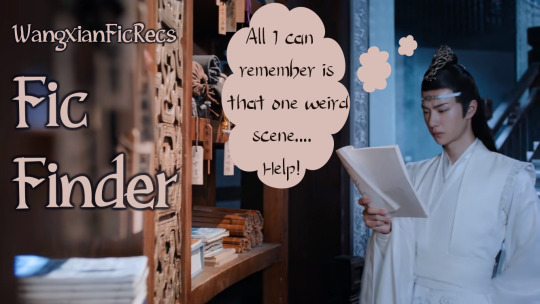
Fic Finder
May 27th
~*~
1. Hello, how's you. I'm looking a fic, it was a one-shot and meet bad. Lan Wanji lost A-yun at the mall during Christmas 🎄. They saw a CCTV footage of Wei Wuxian walking with A-yun and they thought he kidnapped him. It was all a misunderstanding. They end up coparenting A-yun. Thank you
FOUND? I know what my heart wants by yakuso5u (Not Rated, 28k, WangXian, Modern AU, Single Father LWJ, Fluff, Mutual Pining, Getting Together, Accidental Child Acquisition, Domestic, Slice of Life, Christmas references)
~*~
2. Hey am looking for a fic where Wei Wuxian switches places with the úntame version of himself due to a talisman and finds out that that version of himself and lan wandgi are not together @fanficlover-novels
FOUND? Key Differences by pupeez4eva (T, 5k, WangXian, Humor, Dimension Travel, Crossover, Drama!WWX meets Novel!WWX, Public Confessions, Post-Canon)
~*~
3. please help me to find this one fic. It was a time travel fic where only wwx goes back to the past. But the unique part is wwx is in his older body & with that he clears the burial mounds by himself & then he lives there, many people know about this & started calling him yllz and one day bc everyone thinks that this yllz is a diety they start to sacrifice someone. One day qhj sacrifice lwj, but wwx doesn't want him after that qhj dies, kid lwj fell in love w/yllz Nhs knows yllz from his father
FOUND? Practical Mythology by metisket (T, 17k, WangXian, Time Travel, YLLZ WWX, myths and legends, apparently the burial mounds has to fix everything itself, zombie farm collective, accidental deities, Families of Choice)
~*~
4. Looking for a fic where Wei Wuxian is a jiaoren/merperson and saves Lan Zhan via emergency transformation. From what I recall, LZ was thrown into a river or lake by Wen soldiers, tied and weighted so he'd drown. WWX found him, and didn't have a way to free him from the weights, and had to transform him to keep him alive. Slow transformation. Just gills at first, but no way to stop it once started, so LZ had to stay underwater while they escaped. @shiroookamitoko
FOUND! A Kiss You Can't Breathe Without by ElvenQueens (M, 10k, WangXian, Canon Divergence, Merpeople, Chinese Mythology & Folklore, Fall of Lotus Pier, Animal Transformation, Creature Fic, First Kiss, Fluff and Angst, Hurt/Comfort, Emotional Hurt/Comfort, Drowning)
~*~
5. Hello can i ask for help searching a specific fic? its a modern au and wangxian are friends with benefits, its lwj pov and hes pining hard. wwx got into a car accident that left him in long comatose and jyl kindly invited lwj to sit beside his sickbed and wait for wwx to wake up. lwj comes everyday after work, after wwx wake up lwj volunteered to bring him home and they confessed to each other
FOUND? Almost Lover by vesna (mrsronweasley) (E, 37k, Wangxian, modern, Angst with a happy ending, Hurt/Comfort, a bad thing happens to WWX, LWJ gets very sad, Hospital Scenes, Dubious Medical Science, pining for the person you’re fucking, Friends With Benefits, friends who come together stay together, learning to use our words, there are also rabbits, Traumatic Injury, mention of past WWX/WQ)
~*~
6. hello! do you know which fic is this?
"does anyone know which wangxian fic had the problematic breakup and wwx got w some other dude and had a baby w blue eyes or smth" i found a wangxian divorce fic i wanna read but istg if it’s THAT one-
~*~
7. First of all, thank for all your work!!! I'm searching for a fic and I can't remember clearly the scenes, just that wwx, I think, created a book of interpretation of lwj's reactions paired with short description of what it means and lsz and ljy use it to interpret what lwj wants to say. I think it's like that. Thank you!!!
FOUND? Important Distinctions by nagi_blue (T, 5k, gen, Fluff and Crack, [Podfic] Important Distinctions by semperfiona_podfic (semperfiona))
~*~
8. I'm absolutely going batty trying to find this fic! It's Wangxian, but not central to the boys in that it's in Jin Zixuan's POV & he kills Wen Xu with a Yu blade while pretending to be hunting for deer on behalf of Mme Jin(?). (it's not the unbearable pain of being seen antho by meyari, but similar in tone.) Basically, JZX turns the fate of the entire war on its ear, bc he is competent. Help, please!! (and thank you!) @thelima-aka-chickwriter
FOUND! 🔒 Moments of Revelation by meyari (T, 133k, ChengSang, WangXian, XiYao, POV JC, Canon Divergence, Temporary Character Death, Character Death, not anyone we care about, Time Travel Fix-It, Self-Sacrifice, Torture, Chronic Pain, Chronic anxiety, Grief/Mourning, PTSD, Chronic Mental Health Issues, Assassination, renamed MY, Families of Choice, Unreliable Narrator(s), Demonic Possession)
~*~
9. Hello, I'm looking for a fic, I remember there was a battle between Wei Ying and the Lan clan and Wei Ying wins, and spares Lan Zhan. Then Lan Zhan spends 2 weeks (or more) day and night burying all the dead then collapses from exhaustion. He is saved by Wei Ying and treated by Wen Qing but spends a good time bedridden with an inability to raise his arms. That's my only memory. Thanks in advance :) @wesenyr
FOUND? help is on the way by Vamillepudding (M, 15k, WangXian, Canon Divergence, YLLZ WWX, LWJ Needs a Hug, Fairy Tale Elements)
~*~
10. Hi sorry, can you help me find a fic please!
It's a wangxian dom/sub universe. The author had originally posted the fic on another website, and then uploaded it to AO3. They recently made the fic a mystery fic, so idk if anyone can find the original post or a download of it 😭
It was a dom lwz and sub wwx, with lwz being in a relationship with mo xuanyu but he takes in wwx to help train him. It endgame wwx, with mo xuanyu being okay with wangxian being together. It also has slight wwx/jgy at the beginning but it's nothing serious. @i-swear-we-were-okay
FOUND? backfire (🔒squidgewolrd link) by spookykingdomstarlight (E, 115k, WangXian, WangYu, one-sided XianYu, MingYu, Modern AU, Biologically Determined Dom/sub Roles, BDSM, Bad BDSM etiquette, Sadism Masochism, Past Sexual Abuse, Sexual Slavery, Self-Harm, BDSM as a Form of Self-Harm, Minor Character Death(s), Arson, Shades of Black Widow WWX, Extremely Dubious Consent, Rape/Non-Con Elements, Normalized Homosexuality and Bisexuality, Normalized Polyamory, Nonsexual BDSM, Slow Burn, Mutual Pining, Pining WWX, Jealous WWX, Touch-Starved WWX, Professional Dominant WWX, Sex Worker WWX, Gentle Dom LWJ, Mean Dom LWJ, Oblivious LWJ, Past WC/WWX, Minor JGY/WWX, Mentioned WWX/Others, Emotional Infidelity, Angst with a Happy Ending, Endgame Wangxian, MXY Also Gets a Happy Ending, Additional Warnings In Author’s Note) I think is for #10, their non gift fics are on their website
~*~
11. Excuse me? But could you help me rediscover the fanfic series where the first fanfic story starts with Wei Ying from the modern era in a T-shirt, basketball shorts, and tennis shoes (with a plastic grocery bag of energy drinks) chances upon Lan Wangji at Cloud Recesses. In the time of the novel post Sunshot Campaign. So the mystery is about why Wei Ying was brought into the past. (Spoiler Alert: It's about soulmates)
The second story of the series is about how Wei Ying and Lan Wangji split time between the modern era and the Cultivation era. There is an incense burner scene where Wei Ying gets to seduce Lan Wangji at their first meeting with his bare legs in his basketball shorts. Another is about Lan Wangji getting jealous about Wei Ying using his dildos from before their relationships.
Would you please help me with this? I hope you have a great day. @kaitou-cure-prism12
FOUND? Wrong Turn, Right Place by diamondbruise (E, 71k, WangXian, Time Travel, kind of, it’s more reality travel but there’s modern wwx and cultivator lwj, Mutual Pining, Angst with a Happy Ending, Jealousy, Idiots in Love, Slow Burn, Misunderstandings, Cultural Differences)
FOUND? Dramaturgy by slex (slexenskee) (T, 62k, WIP, WangXian, Isekai, Canon Divergence, modern!wwx, Bisexual disaster WWX, not intentionally a fix-it AU but definitely a fix-it AU, Transmigration, Identity Porn, Computer Science)
~*~
12. hi! is it true that there's a Wangxian fic based on the k-drama 'Whe Life Gives You Tangerines'?
~*~
13. I have a specific fic I'm looking for! It was wangxian modern AU, where wwx and a-yuan were somewhat in hiding. Nmj/nhs and the wen siblings (I think) knew what was going on and were helping them. Wwx moved around a lot to avoid detection until one day wwx meets lwj and falls in love and doesn't want to leave. I didn't read far enough to learn what exactly they were in hiding for, but the tags I remember made it seem like a wwx whump fic. I know it's not a lot to go on but I appreciate any help! Thank you! @scienceontheweekdays
~*~
14. Looking for a fic where wwx stumbles upon a cave and find a big egg in a nest and after releasing he might lose his life if the parent of the egg came back and found him there, but before he could escape, comes back, wwx try to reason with it only for the dragon to start sniffing him and circling around him then-- yeah papapa happens. (Can't remember if wwx was human or fox, also not sure if he actually saw an egg or just a nest but I'd say he did see both)
FOUND? Magic Carpet Ride by ariskamalt (E, 6k, WangXian, Human WWX, Dragon LWJ, Virgin WWX, Dubious Consent, Rimming, Blowjobs, Anal Sex, Shapeshifting, Double Penetration in One Hole, Telepathy, Creampie, Mistaken Identity, WWX's LWJ slutification, PWP)
FOUND? 🔒 To Hatch a Mate by Missty0foxx (E, 15k, WangXian, Alternate Universe, Canon Era, Dragon LWJ/Fox WWX, Older WWX, Younger LWJ, Love at First Sight, LWJ Has Two Penises, Mating Cycles/In Heat, Masturbation, WWX Self-Lubricates, LWJ Has a Big Dick, Anal Sex, Double Anal Penetration, Belly Bulge, Creampie, LWJ Has a Biting Kink, Cock Warming, Nesting, Angst, Implied/Referenced Character Death, Mild Blood, WangXian Get a Happy Ending, LWJ & WWX Have a Breeding Kink)
~*~
15. Hi, I’m looking for a fic I read a while back and unfortunately I remember very little of it so I don’t even know where to start looking for it. LWJ is the emperor or prince and WWX has been sent to him as a concubine (i think) by the Jiangs but LWJ is not aware that his concubine is WWX, I think he is under the impression that WWX is missing or dead… I remember WWX coming into the throne room and LWJ being chocked that his concubine is WWX. I think A-Yuan had a hand in WWX showing up there or something. Sorry I know it’s not much to go on but it’s been living rent free in my mind for a while now. Thank you @unlimitedsparks
FOUND! True Gold Fears No Fire by defractum (nyargles) (M, 82k, WangXian, Royalty AU, Ancient China, Wuxia, Historical Inaccuracy, Arranged Marriage, Identity Porn, Mutual Pining, Emperor!LWJ, empress!wwx, Eventual Happy Ending, Misunderstandings)
~*~
16. Hi Mods! i am looking for a Modern AU fic where WWX is dead for a moment and he wakes up in the mortuary? and there was some kind of investigation becouse magic could have been used in him? he was living with the wen siblings or was in close contaac with them. thats all i can remember (sorry for my bad grammar i am not a native speaker) @nashajtc
FOUND? 🔒 care by everbrighter (T, 35k, LSZ & WWX, WangXian, Resurrection, they have a son, Family Bonding, Getting to Know Each Other, Past Character Death, Mutual Pining, Kid Fic, Sexual Tension, (between lan yuan's pining dads), Modern with Magic) The Sudden Nature series specifically the 7th work is very similar to this ask
FOUND? 🔒 Swing From the Gallows and Wave by NyxNuit (E, 126k, WangXian, Modern with Magic, They're not 'cultivators' they're Exorcists, Murder Mystery, does this count as crack?, featuring my attempts at humor, demon hunter AU, general amounts of absurdity, cameos from other MXTX characters, Major Character Undeath, the typical pining we expect from WangXian, Not a Slow Burn Tho, the usual gratuitous music references, and gratuitous pop culture references, Sexual Content, featuring Yunmeng Bros reconciliation)
~*~
17. Hi can u help me find a fic? its a modern setting au with fwb wangxian and pining lan zhan. weiying got into a car accident and lan zhan took care of him by invitation of jiang yanli, weiying was in a coma for a long time but lan zhan dutifully waited on his hospital bedside everyday then after weiying wake up he took him and care for him. and confessions ensue. thanks! @heizelberry
FOUND? Almost Lover by vesna (mrsronweasley) (E, 37k, Wangxian, modern, Angst with a happy ending, Hurt/Comfort, a bad thing happens to WWX, LWJ gets very sad, Hospital Scenes, Dubious Medical Science, pining for the person you’re fucking, Friends With Benefits, friends who come together stay together, learning to use our words, there are also rabbits, Traumatic Injury, mention of past WWX/WQ)
~*~
18. Hiiii! Hope you're having a great day! I'm looking for a fic where LWJ is sent to kill the YLLZ without knowing it's WWX. I believe it was an one-shot. Thank You in advance!
🔒 Caught me by surprise by Say (G, 1k, WangXian, Canon Divergence, Love at First Sight, YLLZ WWX, Fluff, Domestic Fluff, Cute, No Angst) he was sent to apprehend YLLZ not necessarily kill him. There is another one where Lan Zhan is dressed as a dancer and then literally tried to sword fight wei ying , im looking for it now.
FOUND? hidden faces by sarahyyy (T, 1k, WangXian, Alternate Universe, Mistaken Identity, Mild Hurt/Comfort, wwx probably wasn't found by jfm or taken into the jiang sect here, so he grew up on the streets and wandered into the burial mounds at some point, and p much grew up cultivating on resentful energy etc etc, still helped take down wrh still helped take in wen remnants though)
~*~
19. Looking for a fic, Niè Huaisang POV, crack-ish. Journal entries of his side of the novel, he has a handful of people helping him with his schemes. I read it a few years ago and apparently did not bookmark it. He eventually curses that he’s going to have to marry his most capable assistant and become chief cultivator. @any-mouse
~*~
20. I was hoping someone knew of a fic where WWX reincarnates/ressurects as a fox kit? It's fairy recent to his death and he is reborn as part of a litter of foxes near Cloud Recesses. He hunts or plays with the rabbits and is found by LWJ and A-Yuan. There's mention later that his fox mother may have gained spiritual awareness due to the proximity of WWX's spiritual energy. I can't really remember more. Thanks in advance! @yilingweiclan
FOUND? Pin the tail on the fox by RMoonberry (Not Rated, 40k, WIP, WangXian, fox wwx, Reincarnation, Good Uncle LQR, WWX is too attractive huli jing, Light Angst, LXC is very naive, WWX and JC's reconciliation, the family feels, Misunderstandings, Hurt/Comfort, Fluff, WWX is pampered, Typical Canon Violence, i think, Spirit Animals, Shapeshifter, Canon Divergence, white hair wwx, Non-consensual drug use., historical inaccuracy., mythical beasts, Implied Torture, Inaccurate use of medicines)
~*~
99 notes
·
View notes
Text
what's the kindest way to say: you took away my friend, my buddy?
(long animatic ramble under the cut :o)
okay. so, this was largely fanon and self-indulgent project, partially because i felt like i didn't make many things solely for myself.
the animatic revolves around two characters, being jonnaay and pili (mocha, pili2, and ace), with the central idea revolving around jonnaay sort of searching (?) for the remnants of mocha in the iterations afterwards.
i've grown to become quite attached to their dynamic, even if there isn't much of them, mostly because of the idea around a successor (jonnaay) who was meant to take up the role of their predecessor (mocha) but failed, as well as their several other similarities and differences regarding their mindset around killing, their faction, etc.
the lyrics are kind of used as this ironic instrument, because the words describe an attempt at being "soft" or "kind" when mocha and jonnaay are both characters that would largely be described as antonyms to both of those ideas.
the idea of "taking away" his friend (mocha) differs from one iteration to the next: in the first segment, it is clown who literally took mocha away, but in the second, it is pili2 who took mocha away as in, taking mocha's place instead. there was also the deliberate choice to show jonnaay glancing from afar at pili2 surrounded by people (end fight when pili2 first showed up), kinda to set an impression that this isn't the same person as before.
ace was the more interesting of the three. ace, because they have memories of both of the previous iterations, kinda exists as someone giving jonnaay his closure on where his friend had departed to, but jonnaay is still shown being reserved because this still isn't his friend.
in this way, the "taking away" also coincides with the idea of iterations like pili2 and ace "taking up" mocha's role but also taking up the space for mocha's memory (ie mocha's impact/legacy largely disappearing from the world other than the memories they has left behind for people)
the animatic concludes with jonnaay sitting under a tree, huddled in on himself, a reference to how bad had eaten mocha's body and buried the rest under a tree, being then the closest thing mocha got to a grave (shout out to @siren-of-fire for talking about this, otherwise i wouldn't have know hehe). whether this is the tree mocha's body is under is for viewer interpretation, but it is meant to be a sort of scene where jonnaay trying to be as, in a way, physically close to mocha as he can, a depiction of him stubbornly holding onto mocha's memory and refusing to move on.
a lot of this is headcanon, if not just outright fanon, but the joys of liking a character like jonnaay is that there's such little actual lore equivalent content that i can just !!! interpret things however i please !!!! and i think it's a lot more fun to think about the "what if"s and alternate scenarios to how things could have gone, especially in a story perspective. plus !! i made this for myself, so lowk who gaf if its a teeny bit ooc. oki ramble over i think, keno out
#my art#keno keytalks#trsmp#the realm smp#the realm fanart#tr!jonnaay#tr!pili#dtowncat#jonnaay#dtowncat fanart#jonnaay fanart
104 notes
·
View notes
Text
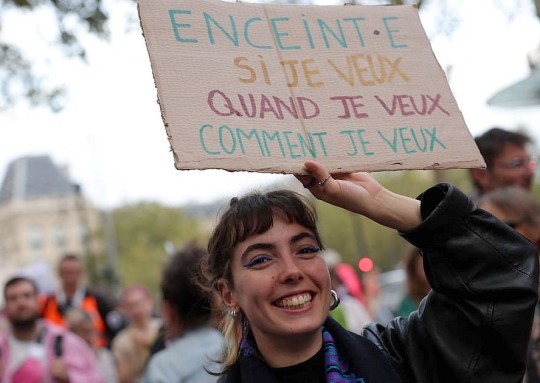
"PREGNANT, IF I WANT, WHEN I WANT, HOW I WANT" FRANCE BECOMES FIRST COUNTRY TO EXPLICITLY ENSHRINE ABORTION RIGHTS IN CONSTITUTION The Washington Post | Published March 4, 2024 PARIS — With the endorsement of a specially convened session of lawmakers at Versailles, France on Monday became the first country in the world to explicitly enshrine abortion rights in its constitution — an effort galvanized by the rollback of protections in the United States. The amendment referring to abortion as a “guaranteed freedom” needed the approval of three-fifths of lawmakers — or 512 votes. The vote result on Monday evening was 780 in favor and 72 against. “We’re sending a message to all women: your body belongs to you and no one can decide for you,” Prime Minister Gabriel Attal told lawmakers assembled in Versailles. Thousands of Parisians gathered to watch the proceedings live on a giant television screen at Le Parvis des Droits de l’Homme — or “Human Rights Square” — in central Paris, with the Eiffel Tower looming dramatically over the scene. Before the political debate began, the television screen showed a montage of women’s rights campaigners around the world holding signs declaring, “My body is mine” and “My body, my choice.” The sound system blared Aretha Franklin’s “Respect.” Parisians driving by honked their horns. France decriminalized abortion in 1975; abortion is legal for any reason through the 14th week of pregnancy. This amendment won’t change any of that. But while other countries have inferred abortion rights protections from their constitutions, as the U.S. Supreme Court did in Roe v. Wade, France is the first to explicitly codify in its constitution that abortion rights are protected. France is not interpreting its constitution; it is changing its constitution. The outcome was “also a promise for all women who fight all over the world for the right to have autonomy over their bodies — in Argentina, in the United States, in Andorra, in Italy, in Hungary, in Poland,” said lawmaker Mathilde Panot, who had introduced the bill in the National Assembly. “This vote today tells them: your struggle is ours, this victory is yours.” People gather near the Eiffel Tower during the broadcast of the special session of Parliament, in Paris on Monday.
431 notes
·
View notes
Text
✨Another Southern Raiders Analysis✨
I’ve been rewatching ATLA so here’s my take on The Southern Raiders. I’ll mostly be speaking to common criticisms I hear about the episode.
Let’s start with Katara. The main critique I see of her in this episode is the way she talks to Sokka. Up until now on the few occasions when Sokka and Katara have fought, it could be boiled down to surface level conflicts, even when there were deeper underpinnings. For example, take the first scene of the series where Katara says “ever since mom died I’ve been doing all the work while you’ve been off playing soldier.” Their mother’s death and Sokka’s sexism are established, but the central thesis of this fight is that Sokka doesn’t help out with chores. While I agree that her “you didn’t love her like I did” line in TSR is very harsh, that’s the intent. By season 3 Katara’s sadness about her mother’s death has taken a backseat to her anger (more on this later). When she’s presented with the opportunity to confront the man who killed her mother (and potentially resolve that anger) and Sokka tells her he doesn’t think she should, she understandably (imo) snaps; how could her brother who has supported her for this entire journey, even helped her orchestrate a prison break and destroy a Fire Nation factory, suddenly shut her down when she has the chance to get justice for their mom? Additionally, Katara overheard Sokka saying in The Runaway that he can’t remember his mother’s face and can only see Katara when he tries to picture her, so I would argue that there’s a grain of truth to Katara’s assertion (or at least that Katara has good reason to believe so).
To Sokka’s credit, I believe he likely was just as afraid of losing his sister as he was of her losing herself. However, he did not convey this clearly, instead choosing to echo Aang immediately without sincerely trying to hear Katara out. I wish the writers had at least given Sokka a line or two before she and Zuko left, but coming off of The Boiling Rock where Sokka resolved his core parental trauma arc by freeing his dad and this episode being positioned right before the finale, I also understand why the focus needed to pivot more towards Aang.
Now I see a lot of people say that Aang is patronizing of Katara in this episode and I agree to an extent. His attempts to convince Katara to forgive her mother’s killer feel somewhat disingenuous, and I’ll get to why momentarily. The other main Katara criticism I see is how she reacts to Aang, telling him he doesn’t understand when he asks what she thinks going on this mission will accomplish. Taken at face value, this is often interpreted as “you don’t understand what it’s like to lose someone you care about.” That is categorically wrong as Aang goes on to illustrate by talking about the sandbenders stealing Appa and the Fire Nation wiping out the Air Nomads. I’m sure Katara hasn’t forgotten about these events so I interpret her line more as “you don’t understand why I need to do this,” which I don’t think is entirely false. While Aang struggles with earthly attachments as we see in The Guru, he tries to adhere to the principles of his monastic upbringing throughout the show. He’s not perfect at this—after all, he’s 12. But since these teachings are his truth, it can be difficult for him to accept the gray areas that other people live in, particularly the darker shades. He imparts the rhetoric of forgiveness unto Katara because that’s what he believes is right, but he isn’t equipped to understand why it’s not helpful for her. However, I can also appreciate that Aang acknowledges that Katara needs to take this journey in the scene where Katara and Zuko are getting ready to take Appa. I also think he’s right that Katara needs forgiveness to heal, he’s just wrong about where she needs to give it.
This brings us to Zuko. I see a lot of criticisms of him in this episode so let’s get into them. First up is that he’s pushing Katara to be the worst version of herself. I wholeheartedly disagree with this. From the beginning of their journey he is the most understanding about what Katara needs and why. He tells Aang that this is about getting closure and justice. While justice has a nebulous meaning here, closure is 100% the primary purpose of this mission. The only time Zuko expresses anything other than complete support is when they find the leader of the raiders and Katara insists that’s not who killed her mother. Zuko appears frustrated here, but I would argue that he’s confused and it sounds angry because that’s just how he talks lol. I think he can tell from Katara’s change in demeanor that she’s on the verge of giving up, walking away more heartbroken than before. This isn’t the closure she needs and by god, he’s going to make sure she gets it. As soon as he interrogates the captain and he gives them the information on Yon Rha, the fight comes back into Katara’s eyes—she wants to keep going. When they finally find Yon Rha, Zuko keeps his mouth shut. He doesn’t encourage, push, or force Katara to do anything; he just watches her do what she needs to do and leaves when she’s ready.
The next big Zuko criticism I see is that he’s just taking Katara on this mission to endear himself to her. I do believe that’s part of the reason, but here’s my question: why is that bad? Why shouldn’t he want this person that he clearly has a lot of respect for to like him? This ties into the other criticism I’ve seen: that he doesn’t understand why Katara is mad at him in the first place. Like he says during their fight after they escape from Azula, “this isn’t fair. Everyone else seems to trust me now. What is it with you?” From this, I get the sense that he underestimated the impact that their time together in Ba Sing Se had on her. Honestly, I’m not sure Katara consciously realized it herself. This is what I was referring to earlier when I said that her sadness about her mother has taken a backseat to her anger. The connection that she and Zuko had in the crystal catacombs may have been brief, but it was strong enough that she offered to try and heal him with the water from the spirit’s spring. It was strong enough that Zuko let her touch his scar. When Zuko betrayed that connection, which started by bonding over their lost mothers, Katara’s mother wound opened wider and anger she’d never been able to deal with began to spill out.
In the season 3 premiere, we get a glimpse of how Katara has changed when she lashes out at her dad, whom she had been eager to see for two seasons. She generally demonstrates more anger throughout the season even before Zuko joins such as in The Painted Lady when she yells at Sokka multiple times for trying to get her to leave the river town. Compare this to Imprisoned in season 1 where she is firm in her resolve to free Haru, but she convinces Sokka and Aang that it’s the right thing to do and gets them to help instead of just taking matters into her own hands. Katara’s core struggle in season 3 is misplaced anger—at her dad, her brother, and finally Zuko. Her anger at him over his betrayal at Ba Sing Se is completely justified! Her anger at him about her mother’s murder, not so much. Having him around though keeps her anger simmering just below the surface because of the bond they shared that he destroyed. Zuko knows he did wrong by her—by everyone in the gaang. But as I said before, I don’t think he knew just how much that connection meant to Katara until she told him (“I was the first person to trust you, and you betrayed me”), which is why he didn’t initially understand why she was still so cold to him after all the good he’d done since joining them. In this episode, he realizes that it’s not enough just to do good. He needs to do something good for Katara because he severely fucked up with her before. And what do you do when you fuck up with someone you care about (“I do care what she thinks of me”)? You try to make it right. In Zuko’s case, he performs a grand gesture to try and get Katara something she clearly, desperately needs that he is uniquely qualified to offer her: closure. Only by getting closure can she make room in her heart for the other thing she needs: forgiveness. She can’t forgive Yon Rha (nor should she imho) but confronting him allows her to leave the dark tunnel that was on the verge of consuming her. And who does she have to thank for that? Zuko. So she forgives him, because he went out of his way to help right the greatest wrong ever done to her, and he did it with care and respect. In forgiving him, Katara is able to come back to herself.
In my opinion, whether you ship Katara and Zuko romantically or not, the arc of their relationship is the heart of the show in many ways. By forging a relationship with Katara, whose home he attacked in the very first episode, Zuko learns to listen to those who he and his family have wronged and tend to their needs to truly make reparations. In turn, by letting Zuko help her, Katara receives concrete proof that a brighter future is possible, and part of that means being open to people from the Fire Nation changing. The fact that Katara and Zuko spend almost all of their remaining screen time in the series together, supporting each other emotionally and risking their lives for each other, emphasizes the importance of their relationship as individual characters who have grown in parallel and as microcosms of the wounded world of ATLA and the path it must take to heal.
Thank you for coming to my Ted Talk 🌊🔥
#atla#katara#zuko#prince zuko#zutara#aang#sokka#katara x zuko#the southern raiders#avatar the last airbender#zuko x katara
64 notes
·
View notes
Note
Eggers confirmed in interview that Ellen wasn't a child, she was teenager at the start of the film. You can probably say there's case of ephebophilia. But there is no CSA there. Also Eggers absolutely saw it as Dark romance and ships it himself. He wouldn't be doing it if there was CSA.
And that's fine, but not everyone accepts Word of God as canon
My thoughts on Eggers' interview statements are that he should have made his intentions clearer if that's what he was going for, because a huge portion of the audience came away with the impression that it was about someone's stalker/rapist coming back to jeopardize the life she'd made for herself out from under his thumb. And like...if he wanted people to not think that, he should have made directing choices that made the onscreen story match his vision better.
You're free to interpret it however you want. What I take issue with is people saying that there's One True Interpretation and no viable way to see it in any other light. There's one interpretation that the director intended, but the movie he actually made leaves holes to interpret it a different way. He shouldn't have made it that way if he had a very specific story to tell.
How can I see it as CSA? Simple. She said she was "a child" when it started and even if she was a young teenager, it being the early 1830s (assuming she's like 20-23 at time of canon, based on statistical age at first marriage for women back then) doesn't magically make 15-year-olds adults. 15 back then was about like 17 now- not a Tiny Baby, but decidedly not a Full Grown-Up either. "Child" CAN be a euphemistic term for a naive or inexperienced adult, but it's not always
And maybe if he wanted people to not interpret her as a literal child...he shouldn't have had her characterize herself that way in the dialogue, talking about when all of this started? "I was so young," "I didn't know better," "I was a fool," "I was naive," etc. SO MANY clearer wordings there. They already didn't get a child actress to play her in the opening scene; without that line, I'd assume it had been like. A few years before her marriage, when she was maybe 17-18, and just seen it as abuse rather than arguable CSA. It's a weird dialogue choice if he wanted to convey "the vampire sex started when she was young but not unacceptably young," like many other weird choices that I felt were counterproductive to his stated narrative aims.
Doesn't mean my interpretation is objectively correct either! But you don't see me going around saying that there's No Way Anyone Could See It As Consensual And That's Wrong And Bad.
I have both been there and done that before, coming from a fandom (Crimson Peak) where there's no way to interpret a central relationship as peer CSA/COCSA if you go by Word of God, but there's absolutely space for that based on what ended up in the actual movie. And I've had to make peace with it, even though I ship that couple to the moon and back.
You like these fake people kissing in this way, and other people don't. And that's fine! You don't need a big moral justification for it, or to have the Single Correct Interpretation!
#ask#anon#nosferatu#nosferatu 2024#now the person who said that Thomas/Lucille was 100% Canonically CSA but Ellen/Orlock was 100% canonically not#needs to chill#because they were counting Word of God as valid canon for Nosferatu but not CPeak#(wherein GDT says the incest was consensual from the start)#(the bios are weird about a lot of things and contradict themselves re: ages at times but that particular bit contradicts nothing onscreen)#and it was just so transparently a case of Wanting The Thing You Liked To Be Objective Canon#But Not The Thing You Didn't Like#via double standard#based on the movies EITHER of those pairings could involve CSA or not#(although one hill I will die on is that Thomas/Lucille would be peer CSA if it was- people love to forget that she's only 2 years older)
70 notes
·
View notes
Text
Hello Barry Allen: Arrow 2x08 Review (The Scientist)
It is bittersweet to remember how much I loved Barry Allen, before The Flash made me hate him with the fiery intensity of a thousand suns, but that’s a topic for another time. Let’s just enjoy this precious golden retriever who comes to Starling City to be the third point in an Olicity love triangle.

And y’all – I love me a good love triangle. Let’s dig in…
Olicity and Barry Allen
Full disclosure I did not know Barry Allen was The Flash when Grant Gustin guest starred on Arrow. I missed every foreshadowing moment of the forthcoming spinoff because I barely knew who The Flash was and really didn’t care.
The husband, of course, filled me in and oddly enough it didn’t tick off in my brain that they were pairing FELICITY SMOAK with one of the most famous comic book characters – a character even more popular than the Green Arrow. This is not something you do if the female character is simply comic relief. (No, I am never letting that Katie Cassidy comment go. Should I move on? Yes. Will I? No.) Season 2 Jen wasn’t that smart y’all. Bottom line, if Season 2 is a chess game, then Felicity Smoak’s pawn will become a queen.
There is a break in a Queen Consolidated warehouse and this is where Oliver, Diggle, Captain Lance and Felicity first meet Barry Allen.
Lance: Who the hell are you?
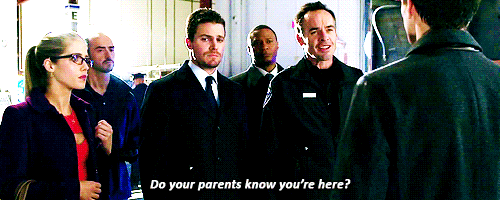
This is one of Oliver’s all-time best comedic lines. Stephen Amell is bringing humor to Oliver’s blinding jealously, which is a lot of fun. It also offsets Oliver’s egomaniacal hypocrisy and makes him far more tolerable. Good choice, Mr. Amell!
Barry: I’m Barry Allen. I’m from the Central City Police Department. I’m with the Crime Scene Investigation unit. We’re working on a case with some similar unexplained elements to Central City. So, when the report of your robbery came over the wire, my captain sent me up here.
I bought his story. Oliver does not.
Barry is convinced it’s one guy who broke down a door of reinforced titanium and the security footage seems to support his theory. Also, the bruising pattern on the dead guard’s neck suggests someone used one hand to break it.
Barry: I’m guessing you don’t know how hard it is to break someone’s nec.
Oliver: Hmm? No. No idea.
Barry also figures out what was stolen – an industrial centrifuge (it separates liquid), which is a very big and heavy machine the thief ripped out of the ground. Felicity offers some explanations, and Barry adds his two cents and soon these two adorable nerds are sparking off all the science.
Felicity: What did you say your name was?
Barry: Barry. Allen.
Felicity: Felicity. Smoak.
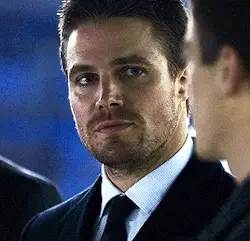
Source: @buffysummers
Barry looks at Felicity for about 1.2 seconds too long and Oliver gives him THE LOOK. Let’s keep those eyes on the centrifuge, Mr. Allen. I’m cackling. Jealous Oliver is one of the best Olivers.
The thing is Barry’s theories are based on evidence and Oliver is taking them very seriously because he knows exactly what can produce that kind of strength in one man.
Both Diggle and Felicity find additional evidence (and video footage!) that proves Barry Allen is dead on. The pup has some smarts! He arrives at Queen Consolidated at Felicity’s invitation. I just love that this young buck is popping up on Oliver’s turf and annoying the crap out of him.
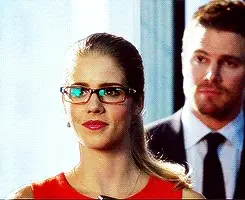
Source: @oliver-and-felicity
Barry makes Felicity laugh and Oliver finds this puzzling. Felicity enjoys laughter and not a simmering pile of brooding man pain??!!

Felicity is socializing with another male. This cannot be born. Oliver gently pulls Felicity toward him, and more precisely away from Barry Allen, to ask a very important question.
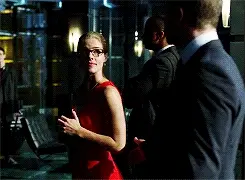
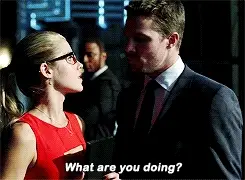
Source: @kurtweller
The way Stephen’s voice rises to a full soprano is flat out hilarious. I accept no other interpretations.
Felicity accurately points out that forensic science is not really her thing, and she could genuinely use Barry’s help to figure out this latest mystery. Oliver agrees, and boy he is not happy about it, but all he can do is make sad puppy eyes as Felicity flounces off with her new “friend.”
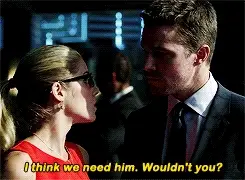
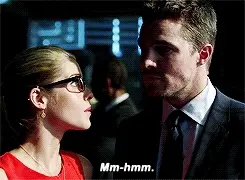
Felicity and Barry gather evidence, and this is the first time Emily Bett Rickards has an equal sparring partner to banter with. The reason Barry and Felicity click so much is because they are basically the same person. That said, inviting Barry into the home office is putting him precariously close to Oliver and team’s nighttime activities and, just like Felicity, Barry is no dummy. He’s done his research on The Vigilante, and it is safe to say that Barry Allen is a fanboy.
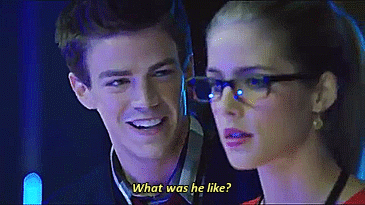
Source: @lyricalarrow
Barry: Green. That’s interesting, right? I mean, why green? Black would be better for stealth and urban camouflage, but personally I think that he trained in some sort of forest or jungle environment and the green is a nod to that.
I love Grant’s reading of this line because no detail is too small for Barry – he’s fascinated by Felicity’s attempt at monosyllabic. But more worrisome for Felicity is Barry, once again, is dead on.
Felicity: I don’t give the vigilante much thought.
Oh girl. You are so bad at lying.

Barry: Police reports show that he uses carbon arrows, but if he switched to an aluminum carbon composite, he would have far better penetration.
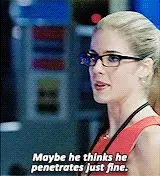
Source: @eddiethawne
This inadvertent sexual innuendo is almost as bad as “It feels really good having you inside me.”
Barry is also convinced that the vigilante has partners. Ok, so let’s just give the kid a job and call it a day. I do like that the writers acknowledge all the obvious things the police should figure out about the vigilante through Barry Allen’s obsessive fanboy investigation. In this way, I feel a kinship to him.
Felicity is curious as to why Barry is so curious, which gives us his character’s back story. His mother was murdered. They never caught the guy who did it and maybe the vigilante would. Barry Allen is looking for a hero. (SAD PANDA)
Barry and Felicity found the truck that stole the centrifuge, and it was just used to rob a blood bank. Oliver pressures Barry for more information about his “similar case” in Central City, but Barry is equally as bad of a liar as Felicity. Actually, he’s worse. Oliver is done with the close proximity to Felicity and the lies.
Oliver: I want you to look into this Allen kid. There’s more to him than he’s letting on.
Diggle: His intentions seem pretty clear to me.
This is why I love Diggle, and he will forever be the number one Olicity shipper. He will nudge Oliver about Felicity when necessary. This teasing remark is also a direct message to Oliver, without flatly calling him out. Barry is being clear about his feelings for Felicity and Oliver is not. Diggle lets Oliver know he has some competition and it’s time to get in the game. But Oliver, no matter how much he knows Diggle is right, is nowhere near ready to do that. Hence, his absolute dejection.

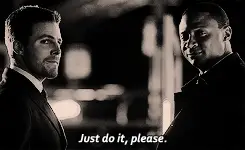
Source: @oliver-and-felicity
This is why Barry Allen is so necessary. It’s been quite a run of Olicity episodes thus far. First, we have the Russia debacle, with Oliver sleeping with Isabel and Felicity was hurt and jealous. Oliver also takes the opportunity to tell Felicity that even though he feels something for her he will never be with her. It’s a pretty definitive slamming of the door on any potential relationship between these two, except these feelings keep brimming to the surface.
Oliver heroically saves Felicity from the Count like a scene straight out of a romance novel. Nothing bonds two people like shared trauma. Oliver also tells Felicity that he will always choose her because nothing is more important to him. I mean honestly this man set the swoon standards.
But these are also some very frustrating episodes – for both Felicity and the viewers. He clearly has feelings for her, will die for her, will kill for her, betray his code for her, but refuses to be with her. So… where the hell does that put them? Oliver and Felicity are in a very murky gray zone.
Oliver knows Felicity wants to be with him. Even if she was trying to hide it (like she is in this episode).
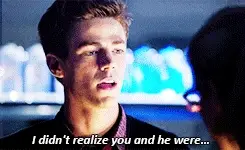
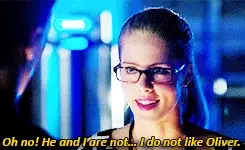
Source: terushimasyuuji
The pain of the Russia debacle made Felicity’s feelings clear. Even Oliver isn’t that stupid, which is what prompted the “I have feelings for you, but I’m going to let you down easy because I’m a selfless hero who is also the dumbest of pine trees to ever exist.” Of course, Oliver likes all Felicity’s attention and concern (because he’s in love with her even if he won’t freaking admit it). Whether they want to admit it or not, there is a serious power imbalance between the two of them. Oliver is calling all the shots.
But it's Felicity's life too. Felicity is asserting her independence with Barry. She is taking Oliver at his word. Ok, you don’t want to be with me? Fine. I will move on. Felicity isn’t trying to make Oliver jealous. In fact, I don’t think she notices he’s jealous at all. I think there’s a large part of her still feels, despite all the moments she’s shared with Oliver and the things he’s said, that he will never feel for her what she feels for him.
Felicity’s feelings for Barry are genuine, which is why it’s driving Oliver crazy. He’s been able to enjoy all the emotional benefits of a relationship with Felicity, without actually being with her. Barry Allen a big bucket of cold water on all the warm fuzzy feelings. He’s also a flashing red warning sign. Oliver needs to understand there is a shelf life to all this “I must suffer because I am undeserving of love.” His trauma will cost him Felicity. She will not wait forever for him.
And there was some part of Oliver, deep down, that thought Felicity would wait forever for him. This is where the egotistical hypocrisy comes in. It’s okay for Oliver to have girlfriends and sleep with whoever he wants when he wants, but Felicity so much as looks at another man, and Oliver is ready to break his neck with his bare hands.

Felicity is a hot ticket. Some guy will absolutely cut in front of you to be with her. This is so Dawson Leary. Yuck. Take it away Pacey Witter.
Pacey: Look at that girl, Dawson. Just take a good look. She's a freaking goddess, man. How long did you think it was gonna be before some guy comes along and is interested in her? I mean, really, dude! And when that happens, what are you gonna do?
Dawson: I'm just gonna take it all as it comes.
Pacey: You're gonna take it as it comes. Oh great, well perhaps you should start figuring out right now because the guy that comes along is not gonna be your best friend and he's not gonna ask for your permission. The guy that comes along is gonna take one look at that woman and just cut right in on ya.
So, am I that bothered that Oliver gets the crap beaten out of him a couple times? Nah. Not really. He had it coming. Maybe the Mirakuru soldier can knock some sense into his concrete head.

Source: @olicitygifs
This was so overly dramatic. Oliver is an enormous man child with muscles. He’s not upset Felicity was a little rough with the medical tape. Didn’t this man use to suture his own bullet wounds, but he can’t handle Felicity’s soft womanly hands against a little scrape? Boy, please. He can’t yell at her about Barry, so he yells about her nursing skills.

Oliver decides to come clean with what he knows about the super strength thief. He tells Felicity and Diggle about the serum on Lian Yu designed to create human weapons. Oliver assures them that Ivo and anyone injected with the serum are dead (spoiler alert Oliver, jeez) and he burned the last of it on the island.
Oliver asks Felicity to analyze the blood on the bent arrowhead.
Felicity: Barry and I will get right on it.
Diggle: I think our Miss Smoak is smitten.
Both statements cause Oliver physical pain. The man can barely breathe. Alright, I’m starting to feel a little sorry for him.
Diggle confirms that Oliver’s suspicions are right about Barry. He’s not being honest about who he is. A very pissy Oliver comes in hot, pumped up on jealousy, testosterone filled overprotection and raging hypocrisy, to confront Barry for lying about who he is – in front of Felicity. Naturally.
Barry immediately confesses the real reason he’s in Starling City. His father is in prison for his mother’s murder. Barry knows his father is innocent because he witnessed the crime. A blur with a person inside killed Barry Allen’s mother. Nobody believes him because that’s crazy. So, he seeks out the crazy cases like a super strength thief in the hopes it will lead to his mother’s real killer and freeing his father. He’s so damn earnest and hopeful, it’s like watching Oliver beat the crap out of a fluffy bunny. This is not a good look when trying to show your not-wife what a douchebag her new boyfriend is. Barry leaves town, which also costs Felicity her date to Moira’s welcome home party Oliver randomly decided to throw.
Instead of immediately apologizing to both Barry and Felicity, Oliver doubles down and defends what he did. Apologizing is not really his forte, so this is not unexpected.
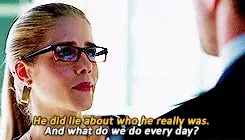
Source: @owenelliots-blog1
I love my unproblematic queen who can acknowledge the mountain of hypocrisy Oliver is standing on. YEAH, BIG GUY. YOU LIE ABOUT YOUR IDENTITY EVERY DAY AND USED TO KILL PEOPLE ON THE REGULAR. TAKE SEVERAL SEATS.
The party for Moira is a disaster. Shockingly nobody shows up to celebrate the freedom of the woman who helped kill hundreds of people in Glades. What a shocker. I love you Oliver, but you are so out of touch sometimes with normal people. Also, the elitist rich of Starling City don’t want to be tainted by associating with the Queen family.
Oliver has thought about his actions and acknowledges he overreacted about Barry.
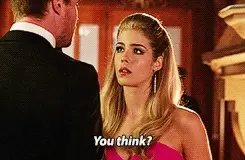
Source: @dianaclairmonts
I love that she doesn’t let him off the hook right away. Felicity is mad and she has every right to be. Barry shouldn’t have lied. I agree with Oliver on this one small point. But both he and Felicity know it wasn’t all nobility, like he’s some standard bearer for the truth, that made Oliver confront Barry like he did. Oliver was trying to obliterate any potential “something” growing between Felicity and Barry – and they both know it.
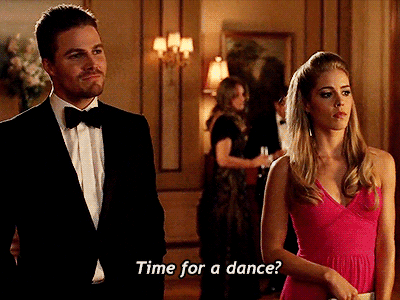
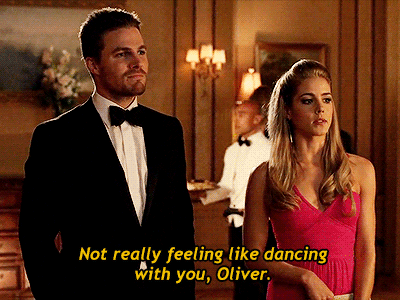
Source: @o-rigamii
My kingdom for these two to dance. Let us not speak of how long we had to wait for it to happen. YEARS, people. YEARS.
Oliver: I know. That’s why I called him. They will card him at the bar.
Awww. He called Barry. Oliver is trying to make it right. I’m even going to allow the snark because it was hilarious. Did you notice Oliver immediately racing to the bar and downing a shot with Isabel to avoid watching Felicity dance with this kid? I did.
Oliver’s acknowledges he has no right to interfere in any relationship Felicity wants with Barry, primarily because he refuses to give her one with him. Oliver is trying to be the better man, to stand back and allow Felicity the happiness he feels he cannot give her. But all I want is for Oliver to cut in. Diggle is right. He needs to get in the game!
Whatever may be happening with Barry – it’s going to be long distance because he needs to go back to Central City, or he’ll be fired. He leaves without kissing Felicity. They are both wistfully hesitant. Interesting.
Is it too soon for a kiss? Yes, especially in the land of television. I like Barry, but I don’t actually want Felicity to end up with him. He’s the third point in the love triangle and that’s all. He’s a mechanism to get Oliver’s ass in gear. I don’t need to see them make out. Also, Barry Allen has always been a little asexual to me.
For Felicity, it’s one thing to say you’re moving on. It is another thing to actually do it. Maybe it’s not so easy for Miss Smoak to put Oliver behind her.
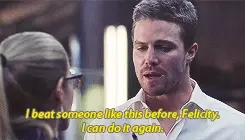
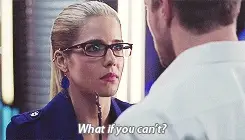
Source: @oliverqueenz
Barry and Felicity determine the sedative in the thief’s blood is Ketamine. (Isn’t that shit for horses?) The only place that has enough for the centrifuge is an ARGUS disaster bunker. It’s time for Oliver to suit up, but Felicity is not sure he should go. The simple fact is the thief’s muscle mass is the same as concrete. Oliver is going to be punching a literal brick wall.
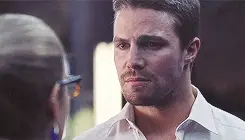
Source: @oliverqueenz
Oliver is a little taken aback. It’s not like Felicity not to believe in him. But this is not lack of belief, it’s a legitimate concern when faced with a scientific reality. Sure, Malcolm Merlyn was bad, but he wasn’t made out of concreate. You can push those romantic feelings as far down as possible, but they will always rise to the surface when the person you love is about to face mortal danger.
Like it or not, Oliver Queen is the Arrow. It is his responsibility to stop guys like this, so he faces off with the super soldier – and gets his ass handed to him on a platter. This guy bounces Oliver around like a ping pong ball. Oliver was also injected with an unknown substance during the fight.
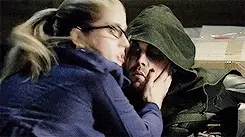
Source: @mrsmaudlin
Diggle and Felicity find him unconscious, but don’t know how to save him because they don’t know what substance he’s poisoned with. Diggle is ready to call 911 and blow the whole vigilante cover to smithereens, but Felicity has another idea. One that can save Oliver and protect his identity – if this person will keep his secret.
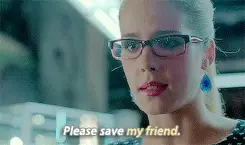
Source: @bifelicitys
One second Barry Allen is waiting at the train station and the next he’s waking up in the Arrow cave, with Felicity begging him to save Oliver.
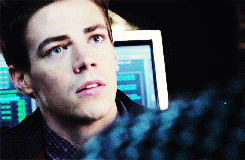
And Oliver is not going to be happy with this turn of events.
Slade and Shado
Slade is in serious trouble. He’s burned half to hell and fading fast. So, is it a little odd that Shado chooses NOW to question Oliver about his romantic life? Yes, but a girl’s gotta do what a girl’s gotta do.
Shado: How do you know that girl?
The girl in question is Sara. ISN’T THAT SUCH AN INTERESTING QUESTION OLIVER? Yes, please do explain to Shado how you know Sara.
Oliver: Sara was on my father’s boat… with me.
Shado: What about the girl in the picture? Laurel. The girl you told me you were in love with.
Oliver: Sara is her sister.
Shado is disgusted, which is the natural and appropriate reaction to anyone finding out about Oliver cheating on Laurel with her sister. This is a canon event, Shado. We can’t interfere. You must realize for yourself why it is impossible to ship Oliver with either Laurel or Sara. I bet Slade isn’t looking so bad right now.
Sara: I guess a lot happened in the last year.
Shado finding out about Sara. Sara is finding out about Shado. Oh, what a tangled web Ollie weaved. Honestly, he was just so slutty.
Just imagine you are Sara. I’m choosing Sara since she’s known Oliver longer, but Shado has every right to be angry too. But imagine you are Sara, and you betrayed your only sister for a guy who hooked up with someone else after you’ve been barely “dead” a year. We know Oliver didn’t forget about Sara, but that’s exactly what it feels like. Such a mess. I can’t imagine Sara loving the choices she made right now.
Did you notice Shado said, “The girl you WERE [Laurel] in love with.” That’s past tense my friends and Oliver doesn’t correct her. Now, Shado might believe Oliver is in love with her (although neither has said these words in a year). Oliver might not want to correct Shado in front of Sara. There could be lots of reasons. It’s difficult to juggle three love interests at the same time. But I don’t think this past tense reference is a small thing.
Team Flashback is on the run and looking for a way to save Slade. Eventually they find the serum and must decide if Slade should take it. They don’t have all the necessary ingredients for a successful super soldier, however.
Oliver: What happens if we give it to Slade without the sedative?
Sara: He’ll die for sure.
Shado: He’s going to die anyway.
That was dark Shado. Dark but true. Ultimately, it’s Slade’s call and he tells Oliver to inject him with the serum. But before he does, Slade uses his last moments to apologize to Shado.
Slade: I’m sorry. For not telling you how I really feel.
Then he touches her hair. SOB. I know some people think this storyline with Slade and Shado came out of nowhere, but I don’t agree. They built this relationship since Season 1, and it makes absolute sense that Slade fell in love with Shado. And it makes absolutely sense why he hid his feelings for so long.
Oliver is SHOCKED by Slade’s confession. At least he is consistently clueless about love in all timelines. What I love more than anything else is Shado doesn’t give two shits about Oliver’s reaction. Her focus is on Slade and only Slade. See? She’s making better choices too.
Slade’s reaction to the serum is violent, complete with bleeding eyes, and then he dies which was slightly anticlimactic to be honest. Oliver and Shado have barely begun to mourn him when Ivo shows up and kidnaps all three. This guy is like a bad case of herpes. He just won’t go away.
Moira and Malcolm
Malcolm is back and he wants Moira to tell Thea who her biological father is.
Moira: You killed Tommy. You killed your son. You cannot have my daughter.
Murdering your child should disqualify you from ever parenting again – I feel like that should be a law. We need to ask why Malcolm cares about Thea now when he never did before? Well, he’s a sociopath so there’s that. Malcolm is all about his “legacy” and now that Tommy is gone – Thea is it. Not that he was ever happy with Tommy in the legacy department, but Thea isn’t replacement Tommy. You don’t swap one child for the other. Doesn’t work that way.
But this isn’t the Moira of Season 1. She’s done fearing Malcolm. When his villain monologue reveals he trained in Nanda Parbat, Moira makes a couple calls. She notifies Rha’s Al Ghul that Malcolm is in Starling City. Since he’s alive, this allows Rha’s AL Ghul the pleasure of killing Malcolm for the Undertaking betraying their code. Is this the first Rha’s Al Ghul mention? The Batman fan in me is geeking out.
Moira: So, my advice to you, Malcolm… run.
I am here for bad ass Moira not taking any more shit. She still doesn’t tell Thea about Malcolm and quite frankly I’m fine with it. I don’t want Thea to know. Can the Queen family just be happy for five minutes?
Stray Thoughts
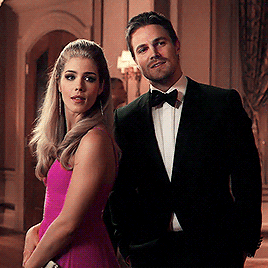
If you are wondering where the pink in my blog comes from – it’s this dress. I think the only dress I love more than this one is the 3x01 red dress.
Oliver and Felicity looked so good this episode. Oliver in suspenders is a lot. I am amazed at their self control.
Felicity: Is it ok to laugh because I was ordered to say anything about you being in prison just to avoid any awkward exchanges.
Oliver: Like that one.
I would die for her.
“Why couldn’t you be marooned in Aruba?” Felicity is so real for this. I’ve been to Aruba. I would love to be marooned there.
“Oliver is a good son, if not the best judge of character.” SHOTS FIRED!! Moira vs Isabel is the Bitch Off I’ve been waiting for.
Put the purse down, Felicity. You aren’t going to get ripped off while dancing with Barry at the Queen mansion.
Sara learned all the science last year. I guess she didn’t have cable tv, so I’ve chosen to find this believable.
Roy is getting a little too close to this Max/super soldier thing and Oliver wants him to back off for his safety– especially since Thea is involved. When Roy refuses, because he’s Roy, the Arrow shoots him. I love Oliver’s Season 2 problem solving skills.
Listen to the Watchover podcast reaction to 2x08!
If you’d like to support the blog, please buy me a cup of tea!
Disclaimer: Any gifs on the blog are not mine. If you would like a gif removed from my reviews, please message me!
#arrow#olicity#arrow 2x08#arrow reviews#arrow season 2 reviews#barry allen#oliver and felicity#arrow season 2 episode reviews#arrow season 2 episode review#watchover podcast#watchover with jen and calli#felicity and barry#john diggle#slade wilson#shado#sara lance#olicity fandom#arrow fandom#season 2 episode review#season 2 episode reviews
59 notes
·
View notes
Text
starting off this account with an art-history-focused reflection on ENA. Dream BBQ is clearly inspired by the surrealist art movement. immediately, my mind goes "what could this mean for the story" and well, it could mean a lot of things! i'm going to share what i have personally been thinking. warning for spoilers.
the surrealist art movement was often political. 1920s communism and anarchism are pretty intertwined with the genre, for a lot of reasons that i won't get into. anyway: the first trailer for Dream BBQ starts off with ENA: The Worker. that's a pretty obvious labor reference that caught my attention. in fact, through the entirety of Dream BBQ, working and labor is a pretty central theme.
another very central theme with ENA herself is identity, or at least individuality in one's own psychology in the face of a conforming society. (even if the "rules" of the society are fairly bizzare to us, because it's surreal media) which is also a big surrealist art thing and also connected to the early communist movement and... [checks watch] ok so i still won't get into the history of that so please read an article or something. sorry. but basically the whole "ENA acts different than many people in her world" is that.
now, i could list every single thing that made this scream THIS IS A SURREALIST CRITICISM OF CAPITALISM!!! at me. but i think you can see it yourself. the theme of guns and bullets in the trailer? yeah, surrealism was actually formed in the aftermath of WW1. yeah. yep, artists were disillusioned with their country. yeah, it could definitely be criticizing to current day wars with a historical spin. ENA falling into that pit of "bodies"? yeah, that could be the whole cog in the capitalist machine thing. all the working/job/labor references? i don't have to explain those.
the REALLY interesting part to try and interpret is the short scene where ENA is having bullets rained on her, from herself, as she cries that she isn't doing anything. this, combined with the genie telling her that "nobody deserves to be punished for being born. except you, of course." really invites some thought. i think, if i was to analyze this as if it was made in the 1920s-1930s, i would say it's a clear reference to the way WW1 soldiers were often shunned, while being traumatized and heavily disillusioned with the war and their country. but the whole "punished for being BORN" doesn't quite fit this interpretation. also, this is a modern piece of media. i want to see what modern interpretation can be found in this, especially with how it might connect to the theme of labor. and i'm going to be so honest: I Have No Idea. there's something there and i think i will only know what it is by Chapter 2. sorry! some people are saying it's a racism allegory. maybe! i don't know.
what does any of this mean for the story? i also don't know! i analyze more than i theorize. if i had to guess, in our future chapters, ENA is going to go on a surreal adventure through representations of capitalism and it will make me very thoughtful and then i give it 5 stars. YAY!
finally, as a side note, the different languages in dialogue were interesting. i do think there is interpretation to be done there, but i'm not sure what yet.
41 notes
·
View notes
Text
On Dan Heng and Draconic Transformations
(Honkai: Star Rail ❗ SPOILER WARNING! ❗)
Dan Heng is an captivating conundrum, a character with a convoluted past shrouded in mystery, and it often seems that finding answers to our questions about him only leads us to further questions.

We know he's the reincarnation of Dan Feng, the previous High Elder of the Xianzhou Luofu's Vidyadhara, and we know multiple forms of interference in the reincarnation process led to an unusual outcome in which Dan Feng's power was transferred imperfectly.
In the Xianzhou Luofu chapter of Honkai: Star Rail's main story, we observe Dan Heng wielding Dan Feng's residual power to change into his more draconic Imbibitor Lunae form, in which he physically resembles his previous incarnation, and command the Vidyadhara's cloudhymn magic for combat as well as for parting the seas of Scalegorge Waterscape. As spectacular and enlightening as this portion of the story is, the audience can't help but ponder further unanswered questions about Dan Heng's identity and capabilities.
From my experience, there are two prominent questions in the Honkai: Star Rail fandom concerning Dan Heng and his transformation abilities:
1. Whether his transformation is voluntary, and 2. Whether he can transform fully into a dragon.
Neither question seems to have been directly answered in canon thus far; the most we've gotten as the audience is hints at potential answers in the form of canon (e.g. character backstories and voicelines) and extra-canon (e.g. character trailers) material -- and some of these hints are delivered much more enigmatically than others (as in the former case). Many players utilize various headcanons to fill in the gaps, leading to a number of different potential interpretations. I'll attempt to address all of these aspects in my analysis of these questions.
Let's start with the first question, since, logically and chronologically speaking, it's relevant before the second.
While Dan Heng's transformation sequence is shown canonically, it's not immediately clear whether the transformation is fully voluntary.
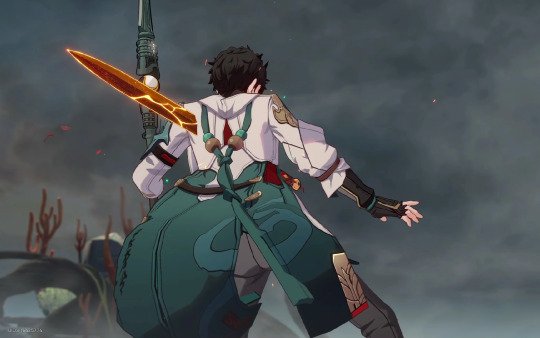
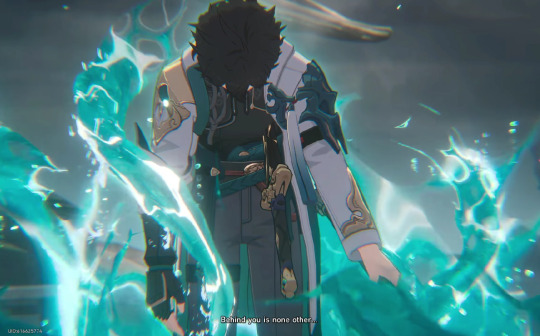
In the Imbibitor Lunae "reveal" scene, when Dan Heng is first shown changing into his Imbibitor Lunae form, said transformation immediately follows Blade running him through with his sword, suggesting a direct connection between the two events. The nature of said connection, however, is canonically ambiguous.
I've seen a common headcanon that Blade stabbing Dan Heng is the sole, direct trigger for this transformation, which would thereby be involuntary. Personally, I think this is a plausible conclusion with intriguing narrative implications worth investigating. After all, Dan Heng's disgruntled expression upon the transformation's conclusion and his delay in reverting to his humanoid form do seem to indicate that changing forms, even if deliberate, was at the very least not a decision he made willingly.
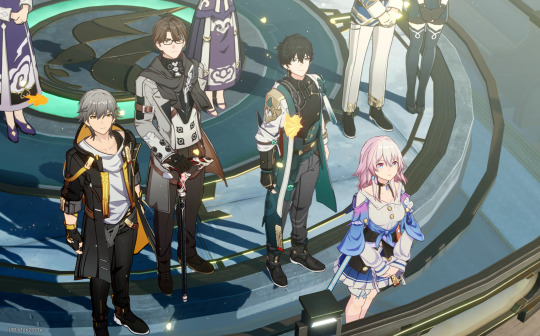

Later in this portion of the main story, Dan Heng is again shown in his humanoid form, indicating that he changed back "off-screen" at some point while returning from Scalegorge Waterscape to Central Starskiff Haven, with the exact mechanism remaining unclear. Then, following this quest, Dan Heng's companion quest "The Dragon Returns Home" becomes available; upon its initiation, Dan Heng has returned to his Imbibitor Lunae form, again with the transformation itself not shown.
This back-and-forth switch does seem to indicate that Dan Heng's transformation is indeed a voluntary process. That said, Honkai: Star Rail's side quests are presented with obscure enough chronology (as in. you can literally do them completely out of order, based on when they unlock and whether you do them immediately or wait months to even start them -- I'm the latter) that I think you could logically support a reading either way.

As far as extra-canon material goes, the most plausible evidence for Dan Heng's transformation being fully volitional is the Dan Heng Imbibitor Lunae trailer "The Prodigal's Return." The video opens with Dan Heng facing Phantylia calmly, Blade absent, as his transformation begins, suggesting that the process is a deliberate "power-up," for which healing mortal wounds, like the one he received from Blade, is a secondary function.
(Granted, from a story standpoint, this is not actually how the fight with Phantylia occurred, so one could argue that this scene is solely for aesthetic/presentation purposes, leaving its canonical significance questionable.)
Lastly, there's the scene in Penacony's dreamscape where Dan Heng appears in his Imbibitor Lunae form alongside Jing Yuan, but it's later revealed that this scene is a mere figment of the Trailblazer's imagination, so as far as canon implications go, it's inconclusive.
So, to summarize our answer for question one: personally I think it's more logically supported that Dan Heng does transform voluntarily. However, given the lack of conclusive evidence, I also think one could make a plausible argument either way, depending on their preferred interpretation.
Which brings us to question two: if Dan Heng, wielding a significant portion of the High Elder's powers, can switch between his humanoid and Imbibitor Lunae forms, does that mean he can also transform fully into a dragon?
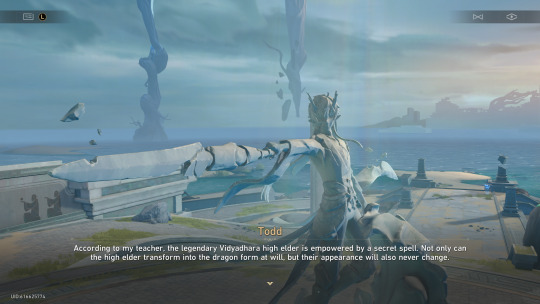
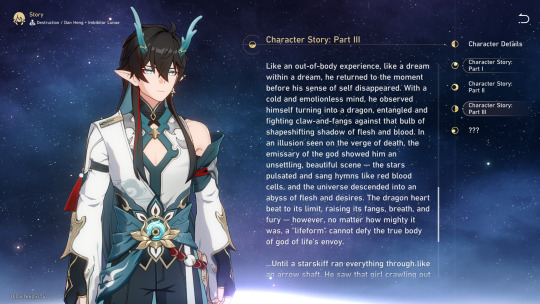
While he hasn't done so yet in the story, it does seem entirely possible. Indeed, the game's lore indicates that the High Elder is capable of changing into a fully draconic form, and that Dan Feng previously did so.
However, so far, beyond his Imbibitor Lunae transformation, Dan Heng is only shown, in his technique and idle animations, performing a partial transformation at the very most -- with his horns growing longer and a translucent, semi-present dragon tail extending from the base of his spine -- serving as a mere suggestion of the possibility of him being capable of transforming further.


Assuming this is an ability he possesses, canonically speaking, it's entirely possible that Dan Heng can perform a full dragon transformation, and hasn't yet simply because he doesn't want to. Several of his Imbibitor Lunae character stories and voicelines, as well as his reluctance to address his past prior to the "reveal," indicate that his draconic identity is a source of deep emotional hardship for him and that he resents his connection to his previous incarnation.

This attitude also explains why, in the "reveal" scene, Dan Heng's change into his Imbibitor Lunae form may have been, even if deliberate, not fully voluntary per se (in other words, he had no other choice).
Hence, at this point, the answers to these two questions can presently be only speculated at best, with ample evidence to support a "yes" response to both, but enough ambiguity that a "no" to either is also plausible.
Of course, with inconclusive evidence contrary to either viewpoint, this means the potential answers to both questions are rewarding to investigate via headcanons. I've seen fans speculate that Dan Heng's Imbibitor Lunae form is his "default" state -- i.e. his "true form" as it is typically referred to in the game's lore -- in that maintaining his humanoid form requires conscious effort, perhaps in the form of the same cloudhymn magic his previous incarnations commanded. This could certainly explain why receiving a mortal wound in his humanoid form would cause him to revert to his more invulnerable Imbibitor Lunae form.
Personally, I think you could also argue the reverse. In his Imbibitor Lunae self-introduction voice-over, Dan Heng refers to his Imbibitor Lunae form as his "original" appearance rather than his "true form," and he appears in his humanoid form in every other part of the story aside from the ones I've mentioned here -- even when he's asleep in his room or otherwise not fully conscious.

Granted, given his feelings on his previous incarnation, these points could simply be a consequence of individual interpretation and willingness (or rather, lack thereof) on his part.
Additionally, in Chinese mythology, the orb held by dragons seems to signify wisdom, prosperity, and spirituality. Therefore, I'm personally inclined to interpret his Imbibitor Lunae idle animation as him deliberately entering a sort of meditative state, and the resulting extensions of his horns and tail as a conscious choice that he "turns off" upon the conclusion of the animation.

But again, this is straying decidedly into headcanon territory, which is fully up to individual interpretation.
So, again, as a fan of dragons, I like to think, based on canon evidence, that Dan Heng indeed transforms voluntarily and could potentially further change into a fully draconic form at some point, but I suppose, story-wise, it remains to be seen!
72 notes
·
View notes
Text
In Buccleuch Docks (Full Scene)
Posted a snippet of this *mumble mumble* ago, promised that the full scene would be delivered, and then forgot about it... until today, on my BoCo high.
What does a Coppernob and Edward reunion in 1964 have to do with BoCo, you ask? Well, this scene is merely Nobby getting a cameo in a big Edward/BoCo WIP I've been tinkering with... on the side...
But this sort of stands alone and should be of interest to Nobbyverse fans. However, this scene is not canon to Bird at Barrow Central (Coppernob not making a visit to Barrow post-bombing until 1996). Indeed, this scene for that matter is based on a rather idiosyncratic interpretation of what was going on with Edward and the N.W.R. immediately prior to the events of Main Line Engines...
Bonus: You'd otherwise not get to "meet" Hal and Sphyrna the Hammerhead Cranes for ages yet...
Warning: It may not be "canon" to Bird at Barrow Central but it is the same fellow so. Be prepared for the angst. Edward's got some stuff goin' on in this WIP too — even if he's a bit in denial about it.
Buccleuch Docks (1964)
Coppernob wasn't expecting visitors at that hour. The sun hadn't yet put in an appearance, so there were no passengers disembarking from ships. Even the Steelworks were quiet — apparently, operations were no longer 'round-the-clock. A few of the Twenties had been able to make a visit, even though Coppernob was at the wrong dock for them to swing by on their usual route, and he expected to see more of them before his week was out. But not at the crack of dawn.
The last Furness engine he had not counted on seeing at all. Coppernob had been loaned to B.R. and stationed at Buccleuch Docks for the week in a blatant attempt to steal some rail-enthusiast thunder from the North Western region, and he well knew it. Odds were that Charles Hatt understood he was being snubbed, and he might have warned his own famous engines off crossing the line and feeding into the ancient engine's publicity.
But the Seagull showed up. Albeit before six a.m. there was a certain amount of discretion involved.
That's what taking the morning post will do for you.
After dropping it off for the mainland engine the Seagull navigated the yard until he was alongside Coppernob's makeshift plinth. His eyes widened when he saw the damage on the older engine's dome and boiler, but Coppernob was well used to that, and for that matter the Seagulls were well used to pretending not to stare. "Good morning, Nobby!"
"'Morning, Two."
At that the Seagull blinked, and his boiler gave a little shudder. "Oh, that still feels so wrong!"
"And I still don't see a nameplate."
"Nobody calls me that."
Coppernob snorted. "Oh yes, you're riding rather high these days, aren’t you? A book named after you and everything. It's lucky you have me to keep your wheels in trim."
"It isn't that. My new name would sound wrong coming from you, too. But you might use my old Furness number... there's no one else left to use it."
"That," said Coppernob, slow and deliberate (a mighty bulwark, warding off sentiment) "would be arrant disrespect to your new owners."
"Ah. And you're famously deferential, of course, to humans not named Ramsden."
Coppernob rolled his eyes. "Your lot always fancied yourselves barristers," he muttered... not quite as crossly, perhaps, as he'd intended. "Though that Charles Hatt is quite a muckety-muck among those national rail types, these days."
"Isn't he just."
"I can remember that boy boarding L.M.S. trains after holidays to return to his apprenticeship… he was slimmer, then."
There was a pause, as both watched the great yellow-and-black hammerhead crane slowly swing a piece of container freight. Coppernob was impassive as ever, but Edward was smiling.
It was the blue engine who next spoke. "Town has never been the same without you… I expect you’re getting a good many visitors here?"
"By the train-load," said Coppernob, matter-of-factly. "They really ought to have put me at the new station. Me being here is a disruption to dock operations."
"They may move you, yet. Have you seen the new station?"
"No. But you needn't wrack your smokebox thinking how to break the news gently. I know very well how ugly it is."
Edward smiled again, tamping down a nostalgic sadness that he knew Coppernob wouldn't appreciate. (Or that he would appreciate, but would take aim at anyway, by reflex.) "Gordon complained about the new station every night for two years."
"He left off complaining too soon." Coppernob eyed the younger engine, committing several mechanical alterations to memory. "Are those new frames?"
"No?"
"Don't take that tone with me. Well, if they're the same old, then that paint is doing wonders. New boiler?"
"No."
"Then why did they raise it?"
"They did swap out for a new one for a bit, while mine was in repairs, and that one required these braces. It seems they liked the look. I'm still not so sure."
"No one cares what you think, son," said Coppernob dryly. "If you please your directors, it's all that matters."
"Thanks, Nobby. Can always count on you."
"Always. You're still taking main line trains, then?"
"Not often." Edward grew quite animated. "My friend BoCo usually takes this train. He offered it to me for a day so that I could come see you. He's a class 28 — you've seen them, haven't you? The main line diesel-electrics that are stabled here. Do you know, they were built by the company that merged with Vickers?"
"All right, son." Coppernob eyed him askance. Not exactly reproving, but bemused. "I didn't need your friend's life story." A faint blush began to grow on the Seagull's smokebox. "What do you do these days, when you're not swapping jobs with dodgy diesels?"
"He's not dodgy."
"Mechanically, son. Mechanically. They have something of a reputation."
"Their engines aren't well-made," Edward admitted reluctantly. "BoCo's very clever about managing around it, though."
"Ah," said Coppernob. "So you have something in common, is that right? But this isn't what I asked."
Edward twisted his lips briefly, the locomotive equivalent of a shrug. "I manage my yard, like always. I don't do much banking anymore, the trains are beyond me, but I help out here and there with branch line goods."
"Hmm. The steelworks engines say they heard your Controller uses you as something of an under-manager."
"The steelworks engines!"
"Yes. They're ex-Furness, you know. Well, the steam engines, obviously."
"Oh, I know. But I never knew them, you know. I hadn't expected they knew anything of me." Honestly the Sodor engine was surprised they were still extant.
"The Twenties have always kept up with the doings of the world. And they knew I'd want to know what was going on with you. Is what they say true?"
"No? Well, sort of. People have been saying I’m a manager now as a bit of a joke. Controller has put me in charge of trialling our newcomers for different things."
Coppernob's expression didn't change, except for his eyebrows to slowly rise. "That's a fair bit of responsibility."
"Well, I've been training up other engines since the '20s. But I'm expected to make recommendations now, and that's new... I suppose. The real difference is that this is fast becoming my only use."
Something between melancholy and bitterness stained those last words. Coppernob acknowledged it only by silence. They spent several minutes watching the activity in the docks. A great bulk carrier was being loaded at one pier. At another a tanker was slowly being siphoned of some of its precious liquid cargo.
"What's it like," asked Edward, "being back?"
Coppernob eyes followed the crate's progress upwards and then over to deck before answering. "The aluminum doesn't seem to do as brisk a trade as the hemitate did."
"No."
Coppernob was still not quick to speak. Edward, however, was these days a practiced listener, and wore him down. "More raw wool and foodstuffs go out. I suppose there are not so many locals to feed as there once were."
"Yes."
"The new crane seems strong."
"Oh, Sphyrna's very good. She's nice, too."
Coppernob gazed at the younger engine, eyes hooded against some hidden emotion. Or joke. "I suppose it would be ungracious of me to say I prefer the old one?"
"Oh," teased the ex-Seagull, "very."
"So many things these days, that I’m not to say."
"Of course you miss Hal," said Edward, more seriously. "There never was such a crane."
"His design was very common. But none braver, no." Coppernob snorted, but his heart wasn't in it. "People make much of what I did in the blitz, which was nothing. Hal kept this place going day and night. He couldn't take shelter when everyone else could. Nice easy target. But they had to take him out before they slowed him down. He never missed a beat."
"No."
"I wonder if the people remember him."
"The locals do," said Edward quietly. "One still hears him spoken of, sometimes. Our new Caledonian engines came and asked me if I knew who they were talking about, and they've only been here a couple of years."
Coppernob seemed to consider some more, eyes continuing to examine the yard.
Finally, with an air of great deliberation, he gave his verdict. "I think my lot ran this place better."
Edward laughed, though subsiding to a diplomatic murmur when he spoke. "That's no very great boast. I hear those Hudswell Clark shunters are rather troublesome."
"To be sure. I've seen for myself." Coppernob, though to be sure his voice had been low to begin with, did not trouble to lower it further. Might have raised it, even. "Not open cheek and frank mischief, either. They've some sly game going. I don't know exactly what scheme they have, but whatever they’re about I know that a hundred years ago you could be scrapped for it without a second's thought. Do they try tricks with your lot?"
"Well, we generally shunt our own goods here. But no, they don't seem to dare give us trouble." Edward heard himself, and chuckled. "That may sound rather brash. It's because of our Controller. Though to be sure Gordon and our Scotsengines are plenty intimidating, even on their own." He gave Coppernob another would-be discreet survey. He was better at it than he and his lot had been back in 1908, that much was for sure. "How's the museum, Nobby?"
Coppernob thought it over. "All right. The Government projected 140 thousand visitors last year, and we had nearly 175."
"Oh, congratulations are in order."
"Government's still not happy. Somehow the money doesn't work out. But it sounds as though the money never is quite right, for a museum. I reckon things are going fair enough."
Edward waited, until seeing that was as much as he was going to get. "Do you like the other engines and things?"
"They're a little mad." Coppernob's mouth quirked as he owned: "So I get on with them. But don't pump me for tales about the others. Unlike some engines I hear of, we make it a point to guard each other's privacy."
"Well, then. Are many of the visitors Londoners? Or do they mostly travel in?"
"About half and half."
"... and do you like them?"
"A few, I suppose. Most I neither like nor dislike — they’re just part of the crowd."
Edward make a little hiss of amused exasperation. "Yes, but — are — are you happy there, Nobby?"
For his trouble he found himself, predictably, pinned by one of Coppernob's most inscrutable gazes. Predictable... and yet in years past it would have been more a blazing glare.
Certainly old Nobby had mellowed in the past few decades. But whether that was something to celebrate or something to mourn was unclear.
"Happy?" muttered Coppernob. "What is this preoccupation everyone has with happiness. In our day no one was happy or unhappy... men no more than their machines. You were decent or shiftless. Honest or ne'er-do-well. If you were happy you were born well or you were dead."
"Yes," agreed Edward. "I think it's been getting better, too. But now it's you who hasn't answered my question. Do you miss Barrow very much, or are you happy at Clapham?"
It hadn’t been easy to make himself ask. And when Edward saw his blank expression, saw how the ancient engine struggled with the question, he suddenly understood that none of them had ever before enquired after Nobby’s well-being, not really. No one had dared think of it. The entire railway, in Edward's day, had run on Coppernob being exactly what they all needed him to be: a source of legitimacy for the directors, entertainment for locals, an attraction for visitors, a role model for engines in service, an ally for the retirees, a minder for the young, a rod of correction for the errant, a reservoir of memory; the old number three seemed to have fulfilled all that was wanted of him effortlessly, with his own feelings immaterial.
And now Coppernob blinked at him. Only vaguely annoyed, instead of wrathful.
"Oh, I'm all right enough. I miss Barrow as it was — but it's not coming back. Better to be among other engines like me and have something to do, than to watch strangers run this town. Clapham is a very comfortable place to sit around and be a well-polished curiosity. Though I rather miss Horwich."
"Horwich!" That had all been a bit surprising, a bit new. But it was that last sentence that really shocked the ex-Seagull. "I should have thought..."
It was Coppernob's turn to twist his lips. "I should have thought, too." Horwich Works had been a curse on Furness engines after the Grouping, its appetite for scrapping younger and younger engines never seeming to abate. In the immediate aftermath of the bombing of Barrow station Edward had needed to make several inquires before learning Coppernob's whereabouts, and the news "taken to Horwich" had chilled him to the firebox. He'd been genuinely surprised several years later when he'd had news of Coppernob putting in an appearance at some centenary celebration in Manchester... alive. "But it's not as if I had to see their scrap lines. If anything I felt closer to the rest there than here. Anyway, I liked being in the shop. There was always something going on — work-y, engine-y sort of things. The workshop really is the heart of a railway and while I was there I could almost feel... But then again, it was dark and noisy, and not the sort of place children come to visit. And I suppose these days B.R. is mismanaging it into the ground. I'm fortunate to be just where I am. Doubtless some other old thing is rusting away in storage because I have their spot at Clapham." And on that note, Coppernob seemed to feel confidences were over. "Tell that absurd Mogul to come over before I've gone."
"I will. Thomas sends his regards. He can't possibly get over this way, but he wanted to say hullo."
"Thomas... ah, yes, that's the little lost sidetank, isn't it." Coppernob's expression didn't change. "Haven't heard that name in a minute."
"Oh yes. I'm sure children who visit transport museums never ask every steam engine they see if they know Thomas the Train."
"Please tell me he has no idea how famous he is."
"Fortunately not. He knows he's a fixture on Sodor but not how far that fame extends. It's about the only secret Controller's ever tried to have everyone keep and succeeded."
"Speaking of fame, I don't know if you noticed that man in street wear. He's taken at least one photograph of us and will probably take more at close-range. You meant to be discreet — will your Controller be angry?"
"Oh, no. Why would he? No, I only wanted to come when it was quiet so as to not get you in trouble. I suppose the whole point in B.R. having you out here was to try to overshadow our region."
"Oh, it was. It very much was."
"Then ought I head off the man with the camera?"
"They care. I don't."
Coppernob gave a secret, wicked smirk, as if to his own self, and Edward grinned. For an instant it was the old Nobby, a Nobby that for the Sodor engine had been bumped askew on his pedestal since 1915, the fearless golden hero of his youth. "Right. Trust you for that. Though I'm afraid I must be saying good-bye. I'm to pick up that petrol and take it back over the bridge."
"Write more often."
"More often! You never answered."
"Perhaps I didn't. Do it anyway."
"Only, I thought I must have annoyed you."
"Son, your lot has been annoying me since before the turn of the century. Don't break tradition at this late date." The old engine looked typically indifferent. Edward knew that expression very well, too well to be fooled by it, but he looked his fill anyway, re-committing it to memory. Coppernob seemed to be doing the same with him, though if he really were then he was much more subtle about it. "After all, you're my only source for news of that blasted island. No more than half of any letter about that Vickers diesel of yours, if you please."
"Very well. And I'll pass on word to James and the others today. I'm so glad to have seen you again, Nobby."
Edward half expected an idle remark in return that he, handsome old Coppernob, was of course well worth the seeing. But Nobby's playful mood — or what passed as a playful mood, for Nobby — had already passed over. He was staring ahead listlessly. Perhaps the mention of tradition had sent him on a reverie. Perhaps he was gloomy at the thought of a new day entertaining modern, unsatisfactory Barrovians. Edward did not imagine for a second that Coppernob's heart was breaking to say good-bye to him. The old engine was too tough for that.
Indeed, it seemed he was too tough to even acknowledge his departure. Edward was about to give up waiting for a response, and he gave a whistle to signal his movement.
He hadn't quite gotten off his brakes, though, when Coppernob, voice urgent and somehow bare, stopped him with a single word.
"Thirty-Four. Don't — " Coppernob broke off for an instant. Then he took a deep breath and finished, as if angry at whatever invisible force had stopped him. "Don't let them do to you what they did to me."
Edward looked over at him.
There was a new Coppernob there. One he had never shown any of the Seagulls. One he probably had shown very few engines at all.
The old engine grinned twistedly, as if to mask it. "That is what young Hatt wants, isn't it? Have you get the newcomers settled, run out your boiler ticket, then stick you on a plinth, probably at that little station of yours. The railway continues to benefit from your experience without your operational costs. I remember. I know how it goes. Don't let them, don’t you dare let them. Better scrap than that. Preservation isn’t any sort of life."
Coppernob didn't look a bit sad. But the intensity of each hissed word betrayed years of solitary pain, and Edward was terribly shaken.
"I — I can't let them scrap me," said Edward numbly. "I've been fighting to prevent that for ages."
"I know."
"Not only for myself, Nobby. I'm not a coward, I know I'm no better than all my brothers who faced the torch. But it would set a precedent for the others — Thomas and the others. I must keep going, at least until they're safe — "
Coppernob gave a harsh laugh, humorless. "Save your puff. I know. Don't I know! You mustn't fall into every single trap I did, son. Anyway, what of it? Do you suppose your friends would be happy in that position? Could you stand by, and watch it happen to them?"
"I — don't know," said Edward, still blank. The truth was that he'd assumed that the younger engines, most of them more popular than he, would be kept operational even if the future Nobby predicted for him (a future that he himself indeed saw coming) came to pass.
Coppernob's gaze was piercing. "I tried to fight them. I knew what a terrible thing they were demanding of me. You won't even try to resist — I taught you too well, didn't I? Duty above all else — that's a rule for a younger engine. It was a good rule for all those other poor sods with their short, normal lives. But you... maybe it makes no difference. It didn't for me. But fight anyway. Once you give your railway fifty years of service, you're allowed to say no, damn it. Loudly, and often."
And then Coppernob looked away. Clearly he thought there was nothing more to be said.
After a dazed moment Edward whistled again, limply, and chuffed off.
He almost forgot the petrol altogether.
#ttte fic#ttte#the railway series#ttte edward#coppernob things#jobeywrites#queue some hard work for a change#is this blatantly a way to get new ttteblr folk who haven't yet had the pleasure to go read the nobby series?#yes it is#yes#i used to inflict emotional damage using oc's and not just by exploring the sodor Bad Timeline 😈 and one day i will again!!1! 😈#those as don't know should learn
31 notes
·
View notes